
This website is managed by Siam Legal International - a law firm in Thailand


Thailand Travel Restrictions
Updated on April 23, 2024 by Siam Legal International, a Bangkok, Thailand law firm.
UPDATED THAILAND TRAVEL RESTRICTIONS
The Tourism Authority of Thailand (TAT) has announced that Thailand continues to welcome all international tourists in 2024 with no restrictions.
Thailand’s Deputy Prime Minister and Minister of Public Health, said “International travelers arriving in Thailand are not required to show proof of vaccination.”
In addition, foreign tourists are not required to show ATK or RT-PCR COVID-19 test results.
Thailand does highly recommends COVID insurance for visitors from all countries when visiting Thailand.
After months of strict travel restrictions because of the COVID-19 pandemic, Thailand is restored to normalcy by easing all travel restrictions and quarantine requirements to allow tourists to enter the country.
Travelers around the world are now keen to find out when and how they can travel to Thailand in 2024. What important things do travelers need to know about Thailand Travel Restrictions if they are planning to fly to the Land of Smiles? Here is some helpful information for you.
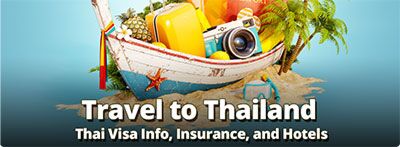
Recommended Documents for Travel to Thailand in 2024
Please have the following documents ready.
- Passport with at least six month validity
- Visa or visa exemption qualification
- Buy Thailand Travel Insurance RECOMMENDED
- Boarding pass to be presented at Passport Control
- Hotel booking confirmation if asked by the Immigration Officer
- Note: Vaccination record no longer required
Incorrect documents will delay the entry screening by rules from the Thai immigration bureau and its Thai immigration officials.
Buy Your Insurance Now
Latest News as of April 25, 2024
- For up-to-date information and weekly updates regarding current Thailand travel restrictions, please visit the Weekly Updates for Thailand Travel Restrictions .
- As of October 1, 2022, Thailand will no longer have COVID entry requirements. Please exercise normal precautions as necessary when visiting Thailand.
- Buy your Travel Insurance now at AXA Thailand .
- Book your hotel in Thailand at Agoda.com
- Travelers may join our Facebook Group to ask questions, get help, and read the latest developments: https://www.facebook.com/groups/howtoenterthailand
Travel to Thailand
Travelers may enter Thailand with or without vaccination. Vaccination is not required.
No phone app for reporting or tracking is required.
No need to show proof of any vaccination or insurance coverage.
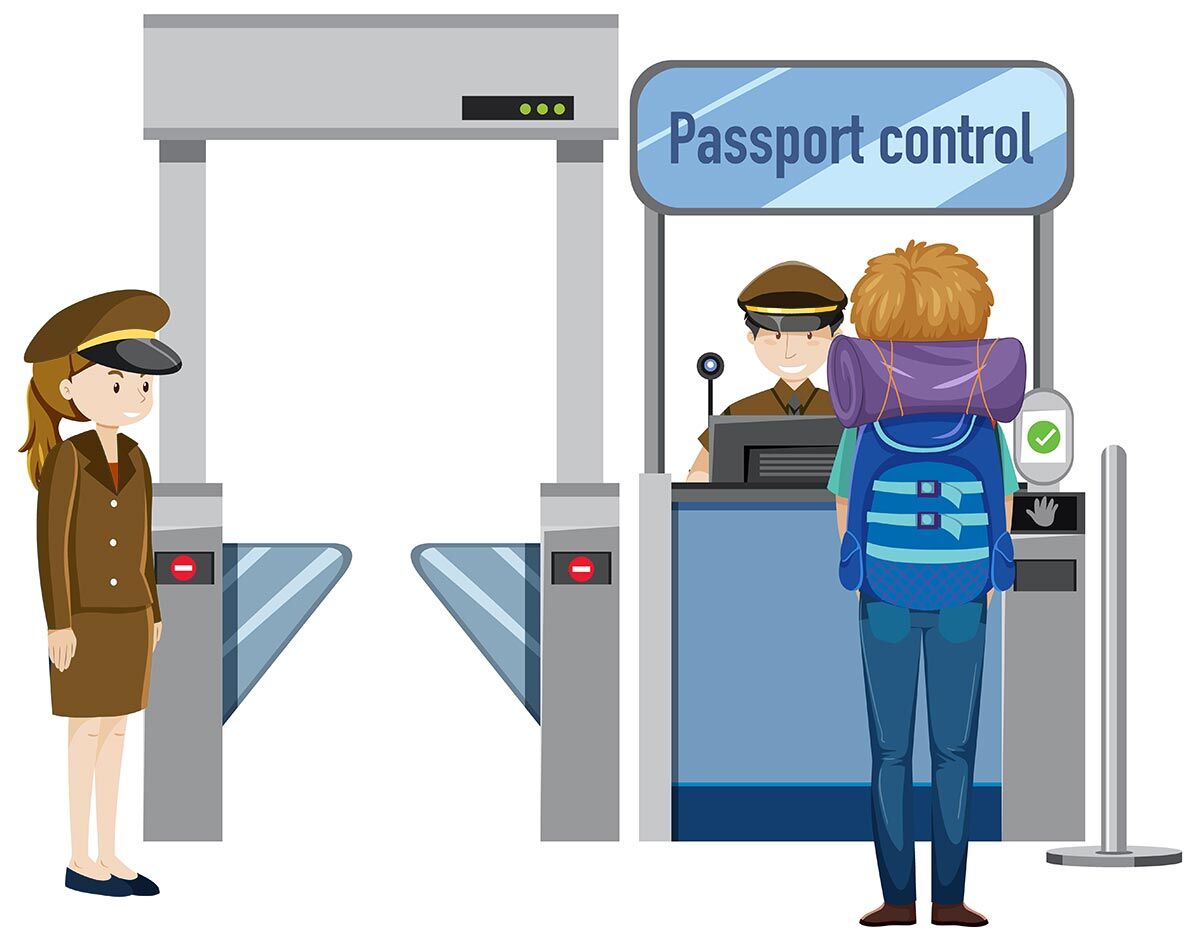
Entry and Exit Requirements
Each country or territory determines its own entry and exit requirements at its borders. If you fail to meet these requirements for your destination, your embassy will not be able to assist you. The following information is provided by Thai authorities and is subject to change without notice.
The entry prerequisites differ based on the passport type you are holding for travel.
Prior to your journey, consult with your travel carrier regarding passport stipulations, as their validity rules might be stricter than those mandated by the destination country.
Ensure that your passport has at least six months of validity remaining upon your arrival in Thailand.
Other Entry Requirements
Immigration officers at the Thai border may request to see a ticket for your return or onward journey, as well as evidence of adequate funds to sustain you throughout your visit. Failure to present these documents may result in denial of entry.
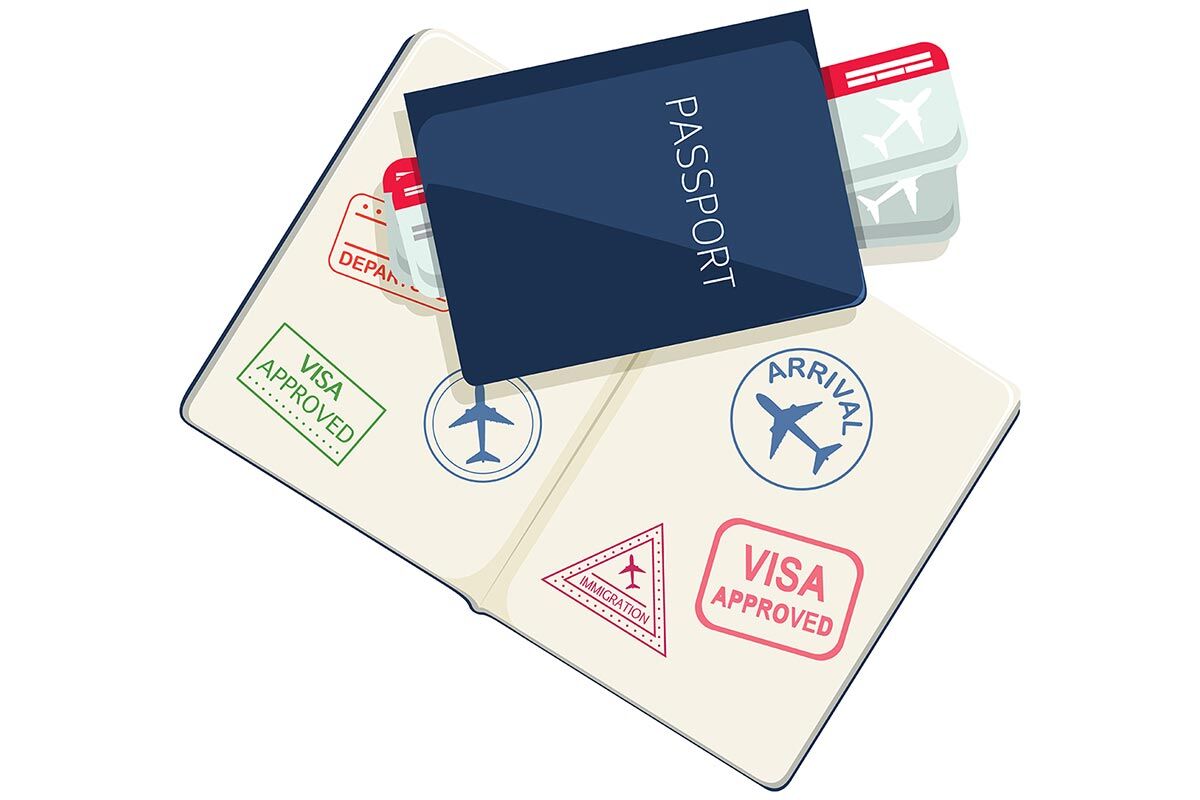
Entry Stamp
Obtain your entry stamp directly from an immigration officer when entering Thailand. Avoid acquiring your visa, visa extension, or entry stamp through visa shops or travel agents within the country.
Passports that have been modified or carry fake visas and entry/exit stamps will be considered invalid. Individuals caught with such passports may face imprisonment, fines, and deportation, and might also be barred from future entry into Thailand.
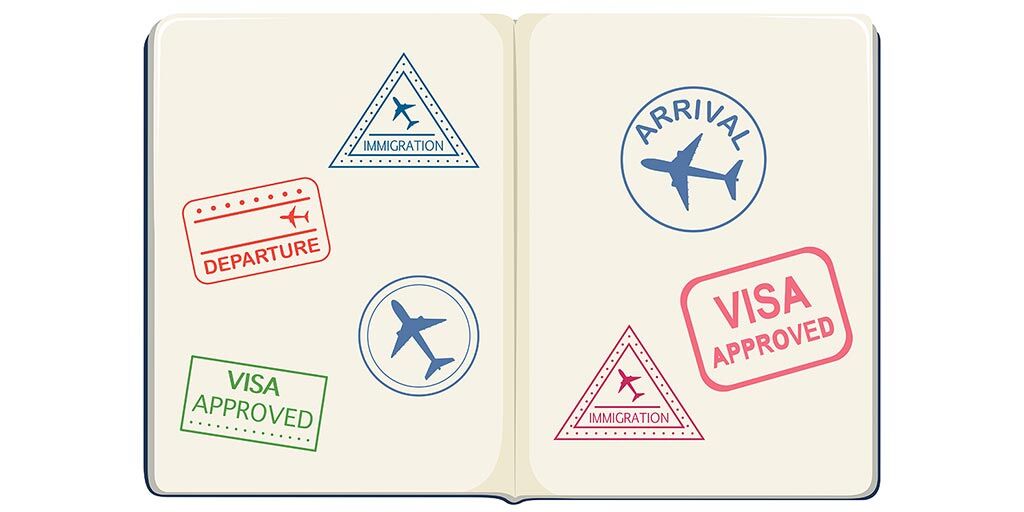
Do You Need a Visa to Enter Thailand?
Visitors from countries under the Visa Exemption List are not required to obtain a Thai visa in order to travel to Thailand for tourism purposes. The Thai Immigration Bureau will allow foreigners to stay in Thailand for 30 days. Tourists will be able to apply for a 30-day visa extension at any local immigration office in Thailand.
If you wish to stay longer or are traveling for a purpose other than tourism, please know that the normal 60-day Tourist Visa Thailand , Thailand LTR Visa , Thai Elite Visa , and other non-immigrant visas are available at Thai Embassies or Consulates around the world.
Are you a high net worth individual who wants to stay in Thailand for 5, 10, or 20 years? You may consider joining the exclusive Thailand Elite Visa membership program. It is an easy-to-apply and hassle-free visa application for your long-term stay in Thailand. For more information about the Thailand Elite Visa Program, you can start visa application, you can start today: https://www.thaiembassy.com/thailand-visa/thai-elite-visa
Thailand Pass is no longer in effect
As of July 1, 2022, Thailand Pass is no longer required for foreign travelers entering Thailand.
Vaccinated travelers do not need to provide proof of vaccination before arriving. Unvaccinated travelers are also under no restrictions and can freely travel to Thailand.
Thailand Travel Insurance for Foreigners
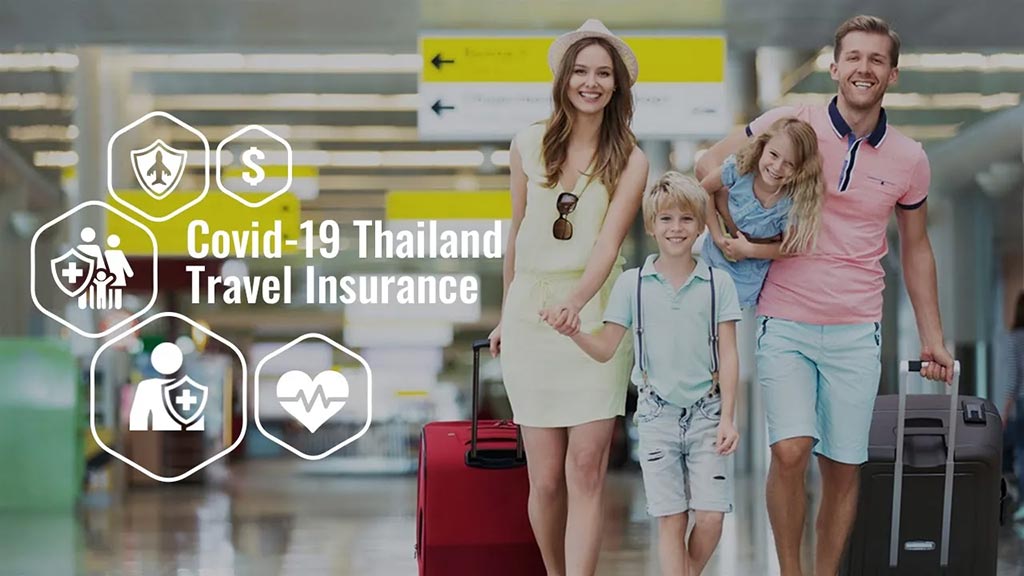
It is recommended for foreigners traveling to Thailand to have a travel insurance policy before departing to Thailand. This is for their protection during the course of their trip to Thailand.
Having a reliable travel insurance policy that covers disruptions protects the investment you’ve made so you can feel secure and covered while enjoying what Thailand has to offer. Purchasing this travel insurance protection is affordable and worth not paying the hospital bill out of your own pocket. The average travel insurance cost for a trip to Thailand is only around $50 to $100.
Purchasing a protection is affordable than paying the hospital bill out from your pocket. The average travel insurance cost for a trip to Thailand is only around $100 to $150.
Foreigners can get a Thailand travel insurance policy easily and conveniently. Visitors can buy travel insurance online with a credit card and the insurance policy and COVID-19 certificate will be sent to you instantly.
Purchase your Thailand Travel Insurance for foreigners HERE .

Flights to Thailand Have Resumed
Regarding flights to Thailand, the normal commercial passenger flights are operating as normal. Before booking flights to Thailand, travelers should ensure that they study the different categories of visas granted to foreign nationals at this time to determine the possibility of travel.
Check within your country’s state department for travel advisories during COVID-19.
No Quarantine Required
Traveling to Thailand has no restrictions at this time.
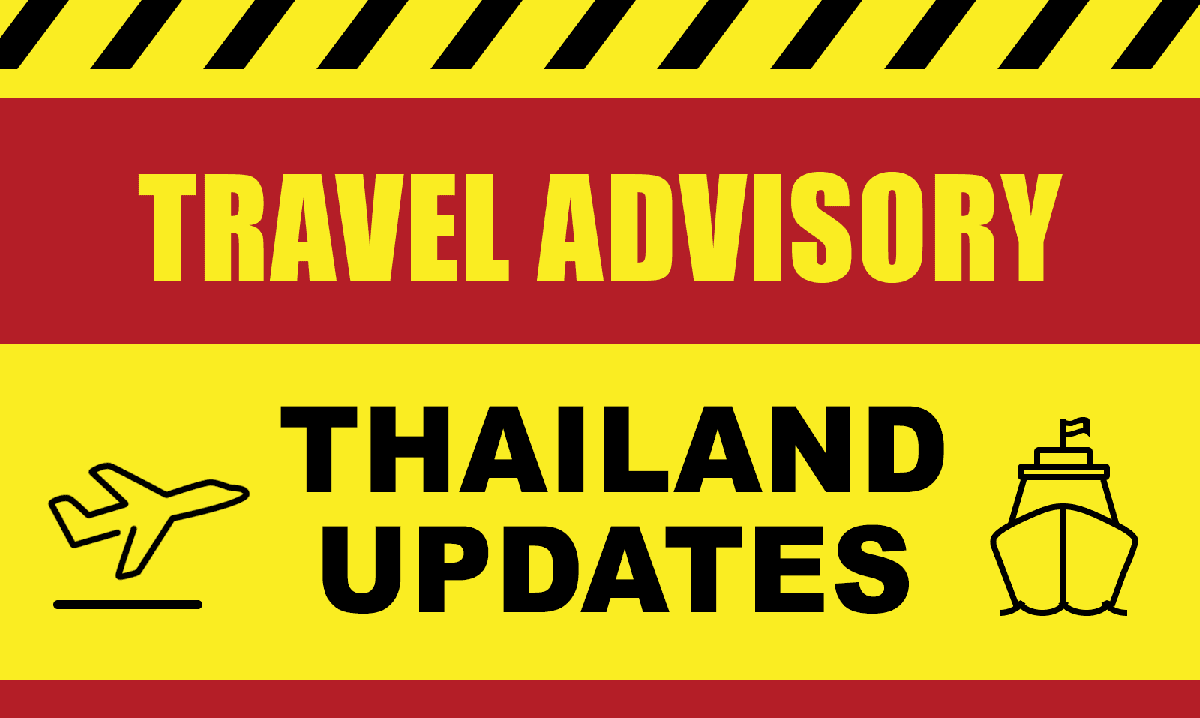
Travel Advisory for Thailand
Tourism is vital to the economy of Thailand. The Thai government has reopened the Kingdom of Thailand to foreign visitors during the COVID-19 pandemic without restriction.
It is important to review news about fast-changing developments within the country before you make travel plans. Information is available on this website, Tourism Authority of Thailand, and on government sites listed below.
Please research your destination of travel and its travel advisory so you have a pleasant experience for your stay in Thailand.
- Bangkok: No restrictions
- Pattaya: No restrictions
- Phuket: No restrictions
- Koh Samui: No restrictions
- Chiang Mai: No restrictions
- Hua Hin: No restrictions
List of Countries that may allow Travel to Thailand (Check with your Embassy for Travel Advisory):
- United States citizens should check with the US Department of State for any travel advisory, news, and emergency situations on their website for Thailand Travel Advisory .
- United Kingdom citizens can check for travel restrictions and news on the FDCO website for Foreign Travel Advice Thailand .
There are no travel requirements and restrictions in place at this time for foreigners entering Thailand.
We recommend contacting your local Thai embassy or consulate before making any plans or reservations. You may also leave your questions in the comment section.
Still have questions?
Visit our Facebook Group and read questions from fellow travelers to Thailand or ask your own:
https://www.facebook.com/groups/howtoenterthailand
Top 20 Questions Asked this Week by Our Visitors
What is the visa exemption scheme.
Thailand has a Visa Exemption Scheme that allows nationals from certain countries to enter Thailand for tourism purposes without a visa. Visitors under this scheme will be granted a stay of a specific duration, typically 30 days, but this may vary based on the traveler’s nationality and the current regulations in place.
Where can I apply for a tourist visa for Thailand?
You can apply for a Thai tourist visa at a Royal Thai Embassy or Consulate in your home country or in a third country.
Below are the general steps involved, but note that processes may vary slightly at different embassies or consulates:
Steps to Apply for a Thai Tourist Visa:
In Person or by Mail
- Find the Nearest Thai Embassy or Consulate: Look for a Royal Thai Embassy or Consulate in your country of residence or a neighboring country. You can usually find this information on the Thai Ministry of Foreign Affairs’ official website or by conducting a simple online search for the Thai Embassy and Consulate near me.
- Prepare Required Documents: Typically, you will need your passport (with at least six months’ validity), completed visa application form, passport-size photographs, proof of travel arrangements (like flight and hotel bookings), and evidence of financial means.
- Submit Application: You may need to submit your visa application and required documents in person, although some embassies or consulates may offer online submission or postal services. Be sure to check the specific submission guidelines for the embassy or consulate where you’re applying.
- Pay Visa Fee: There will usually be a non-refundable visa application fee, which can vary by location and visa type. Payment methods can also differ, so verify this in advance.
- Wait for Processing: Visa processing times can vary. Some applications are processed in a few days, while others may take weeks. Check the estimated processing time and plan accordingly.
- Receive Visa: Once approved, you’ll receive your visa, which will be stamped or affixed to a page in your passport. Carefully review the visa to confirm that all information is accurate and understand the terms of your stay.
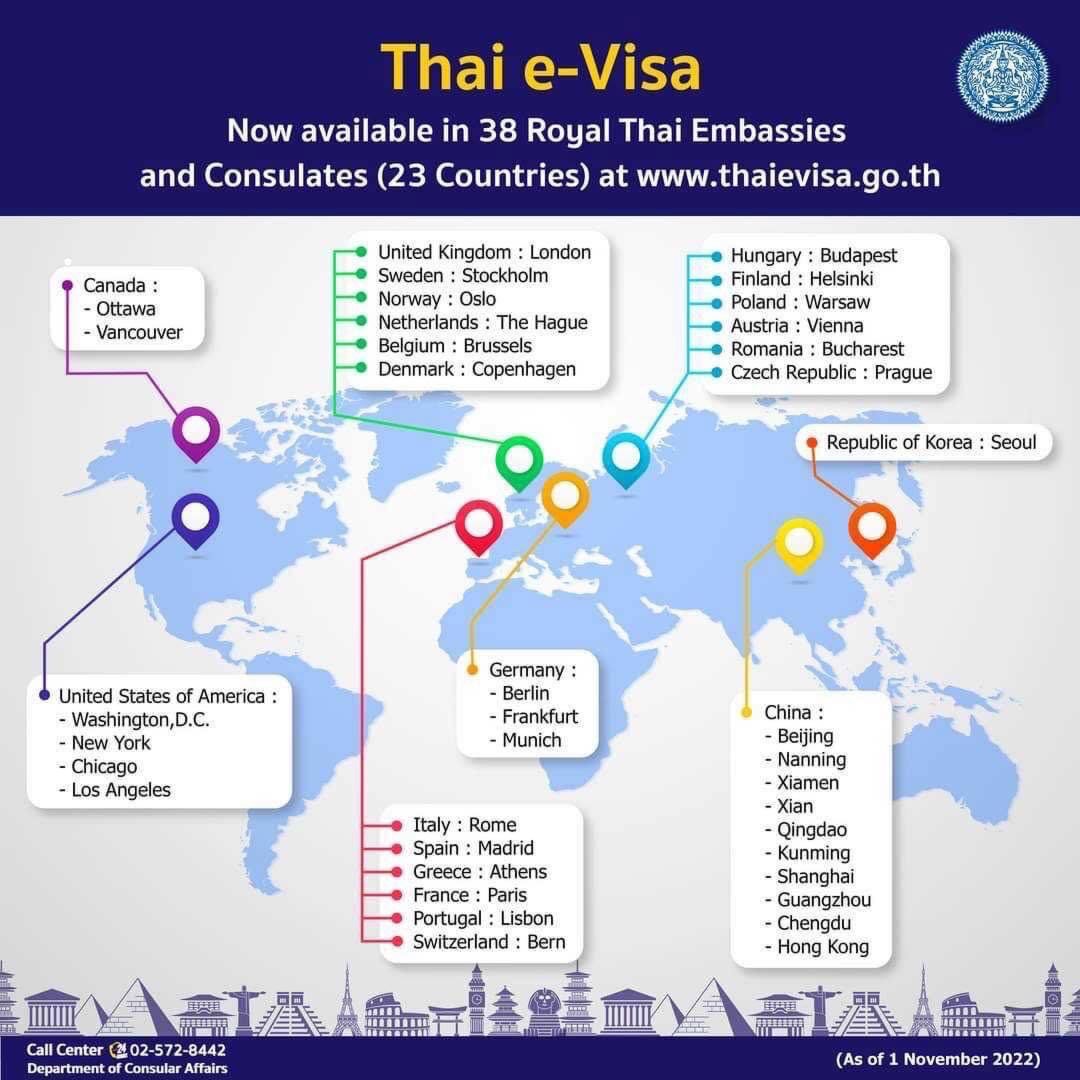
Are there any restrictions on tourists coming to Thailand?
Travel restrictions and requirements for entering Thailand can change frequently due to the ongoing global situation with the COVID-19 pandemic, and other factors that might influence travel policies. The information provided here might be outdated, so it is imperative that you check the most current and relevant travel advisories and updates.
Here are some general restrictions and requirements for tourists entering Thailand.
General Entry Requirements:
- Visa Requirements: Depending on your nationality, you may need a visa to enter Thailand. Some nationals can enter under the Visa Exemption Scheme, while others might need to apply for a visa in advance.
- Valid Passport: A passport with at least six months of remaining validity is typically required.
- Proof of Funds: You might need to demonstrate that you have sufficient funds to support yourself during your stay.
- Onward or Return Ticket: Some travelers may need to show a confirmed ticket for return or onward travel.
Additional Restrictions:
- Travel advisories and restrictions can also depend on the ongoing global and local situation, such as public health concerns, security issues, or other emergencies.
How do I buy an ATK test?
You can also purchase an ATK self-test from pharmacies and 7-11’s in Thailand. They cost between 50-150 Thai baht. ATK testing is optional and not required by the Thai government.
Is Thai Airways operating normal flights in and out of Thailand?
Are masks required to be worn in thailand.
No. You will see many Thai people wearing masks for public health protection.
Is COVID-19 treatment and medicine available to foreigners?
Yes, you may visit any clinic or hospital in Thailand for treatment of COVID-19. Please exercise normal precautions while traveling to obtain treatment if infected or use telemedicine so you can stay safely in your accommodations.
Visitors insured with AXA Travel Insurance will have full coverage for COVID-19 medical treatment. AXA is the most popular Thailand Travel Insurance for foreign travelers.
What is the best time of year to travel to Thailand?
November to February is the best time of year to visit Thailand as it is during the cool season. Thailand has become extremely hot in recent years during the months of April and May.
What activities can you do in Thailand?
- Island hopping
- Scuba diving
- Boat ride in the Andaman sea
- Eat delicious food
- Savory and Tasty Thai foods
What is the best way to find hotels?
You can find listings for hotels in all areas at Agoda .
When is the low season for travel to Thailand?
April to May are the hot season. July to September is the rainy period during the year. These months are the low season.
Are there any restrictions for foreign passport holders?
Travel restrictions and requirements for foreign passport holders entering Thailand can vary widely based on a number of factors, including the traveler’s nationality, the purpose of the visit, the duration of the stay, and the current global and local health situation.
General Entry Restrictions:
- Visa Regulations: Visa policies vary, with some passport holders eligible for visa exemption, visa-on-arrival, or e-visas, while others must secure visas in advance.
- Passport Validity: A minimum passport validity, often six months, is a standard requirement.
- Financial Proof: Travelers might need to demonstrate they possess adequate funds for their stay.
- Return or Onward Ticket: A confirmed ticket for onward or return travel may be necessary.
- Travel History: Entry restrictions might apply based on recent travel history, including visits to specific countries or regions.
Specific Passport-Based Restrictions:
- Diplomatic/Official Passports: Holders of diplomatic or official passports may face different entry requirements or procedures.
- Restricted Nationalities: Some countries impose entry limitations or additional requirements on passport holders from specific nations due to diplomatic relations or security concerns.
Additional Checks and Requirements:
- Security and Background Checks: Security considerations can lead to additional screening, requirements, or restrictions for travelers from certain countries.
Can I rent a private car/taxi from the airport to the hotel?
Yes. travelers can find metered taxis available outside of the airport. All request the use of the meter. Private cars and car hire are also available at the airport counters. Grab is now available at both international airports in Bangkok.
Does the hotel provide transportation?
Hotels charge an additional fee for transportation to and from the airport. The easiest transportation is the metered taxi or on your Grab app.
What is the best way to exchange currency?
If you need money exchanged to use for transportation it is best to do it once outside the Customs area.
The best exchange rates for Thai currency can be found in tourist areas with popular exchange services such as SuperRich or Dee Money.
What insurance should I get?
The most popular insurance coverage is THB 750,000 coverage for medical expenses due to accidents and illnesses (including COVID-19) and THB 1 million for accidental death and disability. You can find trusted insurance coverage at AXA Thailand .
In case of an accident or sickness during the policy period which requires you to receive continued treatment in the hospital, AXA will cover until:
- For inpatient: You are discharged from hospital
- For outpatient: Policy expiry date
What happens after I get my AXA Insurance policy?
After applying for your AXA Insurance, you will receive an email with your policy. You can then upload the policy on your phone for easy reference.
City Travel Guide
- How to Travel to Bangkok
- How to Travel to Phuket
- How to Travel to Pattaya
- How to Travel to Chiang Mai
- How to Travel to Samui
- How to Travel to Hua Hin
Other Thai Elite Visa Pages
Related posts.
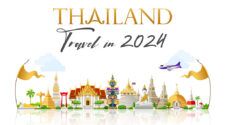
How to Travel to Thailand in 2024

Best Places to Retire in Thailand for Couples
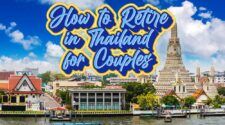
How to Retire in Thailand for Couples

Thailand Travel Restrictions 2023
Leave a comment cancel reply.
Your email address will not be published. Required fields are marked *
This form collects your name, email and content so that we can keep track of the comments placed on the website. By submitting this form, you accepted and agreed on our privacy policy and terms .
588 Comments
Just to make totally sure, I’m gonna ask this very simply: I have no vaccination papers. I have no negative Covid test. I have no travel insurance. Am I still allowed to enter Thailand?
Hello, Lars Andersen.
Unless you are from one of the countries with yellow fever, you do not need to provide vaccination papers and are allowed to enter Thailand.
How much cash in gbp can I bring into Thailand (phuket) for spending money etc?
I would like to ask if I am holding an Indian passport with valid Australian tourist visa, do I need a tourist visa? or can I enter Thailand on the basis of my valid Australian visa?
Also if Nepalese passport holder has valid Australian student visa, do they need to apply tourist visa?
Hello, Chandar Parkas Dimri.
You cannot enter Thailand with any Australian visa. You will need to apply for a Thailand Tourist Visa to enter Thailand. If you’re coming to Thailand to study, you will need to apply for an Education Visa.
I have got a question regarding the updated guidelines as of January 9, 2023
>Airline passengers 18 years old or older must provide proof of full vaccination
I have full vaccination, but it was done in October 2021, do I need to get a new vaccine?

Yes, that is acceptable. You do not need to get a new vaccine. Thank you.
Hi there, we are looking at coming to Thailand for over 30 days but in 2 stints. We will be doing Bangkok and the north followed by the south a few month later. What kind of VISA do you recommend for this?
You can use the 45 days Visa Exemption stamp on each visit. There is no need to get a visa. Please check this information on this page: https://www.thaiembassy.com/weekly-updates/thailand-travel-restrictions-for-november-2022
We will travel Thailand this Monday..
What are the needed requirements?
Dear Marfele,
You may find the entry requirements here: https://www.thaiembassy.com/weekly-updates/thailand-entry-requirements-for-october-2022 Thank you.
If you are vaccinated and Travel to Thailand without PCR testing before leaving SA do you still need to do PCR when you arrive in Thailand but you are fully vaccinated?
Dear Deidre,
The latest entry requirements are posted here: https://www.thaiembassy.com/weekly-updates/thailand-entry-requirements-for-october-2022
Hi, is there a restriction to travel to Phuket from Malaysia by train? (Travelling from Malaysia to Padang Besar Train Station to Hat Yai Train Station to Phuket train terminal 2). Thanks a lot

Dear Oscar,
For this month, just prepare your vaccination card and passport. On October 1st, restriction will be removed.
For more information about travel to Thailand, please check this link: https://www.siam-legal.com/legal-guide/how-to-enter-thailand-2022-guide.pdf
Hi, I’ve read in some of your news that all corona rules fall away from 1 October, that we can travel into the country without having to show a test or certificate. is that right ? Vikram
Dear Vikram,
Yes. Official statement will be announce by the Gazette on October 1st.
For more information about travel to Thailand, please check this link: https://www.thaiembassy.com/weekly-updates/thailand-entry-requirements-for-october-2022
Hello . It says on some Thai websites that from 1 October no one needs a negative test or to show a corona certificate on arrival in Thailand. Is that right ? We will arrive on 1 October in Phuket. Should I be tested as I am not vaccinated?
Dear Albina,
On October 1st, restriction will be removed.
Hello. Should children aged 2 have a negative test ? Up to what age should children have a test ?
If the parents are unvaccinated, children will require too.
Hello again. Is it okay with an Antigen test taken at the hospital or do we have to take only PCR
Yes, It should be professional RAT.
Yordmanu, I have a current, one year ‘retirement’ visa extension and have just returned to UK after a 90 day Thailand Pass trip. I’ve booked a one-way flight back to Thailand for the 9th. November – Will I have to buy insurance & will I be allowed to travel back to Thailand on this one-way ticket? I have an a Thailand address (30 year lease) and a history of travellng back & forth. Peter
Dear Peter,
Insurance is now an optional. It’s not compulsory but still recommended.
Hello. We will travel to Phuket on 1 October. My husband has a dose of vaccine and has been infected with covid twice. Does he have to prove a negative test or does he have to have proof from the doctor that he has had covid twice and has a vaccine? I am not vaccinated but have undergone covid 2 times the children aged 14 and 11 have not been vaccinated, should they have a test before we arrive? Albina
If fully vaccinated, just vaccination certificate and certificate of recovery since he got infected.
For unvaccinated, you need to have negative RT PCR within 72 hours of your arrival. Same procedure with your kids.
I am a Thailand passport holder and returning to Chiang Mai from Kuala Lumpur. What requirements do I need to enter Thailand?
Passport and proof of vaccination.
Do you know the phone number of the Thai embassy in Thailand?
hi, i have 1 question. how about unvaccinated kids age 8-year-old and 4++-year-old?do they need to do pcr test?
If you are fully vaccinated , No. If unvaccinated, same procedure with parents.
I’m seeing conflicting info. Some websites say yes or no, regarding that before departing to thailand, one must show a negative pcr test. For the most part, it seems like no, you don’t have to.. but then more reputable sites say yes, people need to.
so which is it? planning to depart in october of 2022
Dear Balrto,
Negative RT PCR is for those unvaccinated.
Is a “supervised RAT travel test” signed and witnessed by a pharmacist in Australia permitted for entry to Thailand?
Dear Nathan,
Yes, it should be a professional RAT.
Me and my friends will fly to Phuket. Me and my husband have international certificate of vaccination without QR-code on Covid-19. Vaccine is comirnaty (we have two dose and booster) . On website: https://www.tatnews.org/2022/06/covid-19-vaccine-guide-for-travellers-to-thailand/ The information is that when vaccine comirnaty, the 2nd dose must be after 3 weeks, but in my and husband’s certificate is after 4 weeks (first – 19.05.2022, second – 16.06.2022 and booster is 22.01.2022). Is this a problem? Do we need to take a test? Thx You in advance.
No, it means 3 weeks after your shot, more than 21 days in valid.
Do I need to purchase health insurance if I’m only staying in Bangkok for 1 day since my destination is the following day when I arrived in Bandkok?
Insurance is optional. Not compulsory but still recommended.
do the vaccine certificates require to have a qr code? or is that up to the discretion of the airline?
Not really, any proof that you are fully vaccinated will be accepted. If so, then maybe it’s the airlines requirements.
i will arrive bangkok 17:00, transit to Taipei, Taiwan 12:55 on next day. do i still need to book hotel + insurance and proceed PCR test. I am unvaccinated.
Insurance is not compulsory but still recommended. If you are unvaccinated, you need a 72 hours negative RT PCR.
I have flight 06.10 I’m arrive g to Thailand 07.10. I’m not vaccined is that mean I have to take test 04.10 then is 72h before my arrival or I shuld take tests 05.10 or 06.10?
You can do it on 5.10 , validity should be 72 hours upon arrival.
Hello, I might be coming to Thailand in the next month or so, coming from China (not a Chinese citizen). I have been vaccinated but my vaccination shows on my phone – is this presentable?
Hi Charles,
Any proof that you are fully vaccinated.
How long is the Vaccine considered before expiring if I am vaccinated with 2 shots?
Last shot should be not more than 12 months.
Traditional herbal medicines are based on the use of natural remedies like Herbs and Roots, no special food, no lifestyle change to permanently cure drug resistance diseases. people who use this methods like me will definitely testify. three years ago I was permanently cured from herpes simplex virus by Dr Okosun, an African herbalist who eradicates diseases and viruses which the world believes has no cure today with the use of herbs Dr Okosun herbs are hundred percent natural, no after effect and is guaranteed method of getting rid of herpes and other drug resistance diseases which the doctors made us believe has no cure, im one of the hundreds of people cured by dr okosun and you can get in touch with this dr and get your healing just as i did via drokosun55@gmail .com his mobile or whatsapp +2348124363791
Is a photo copy or a photo of my covid card ok? I left my original at home so I wouldn’t lose it.
Yes, any proof that you are fully vaccinated.
On your website it says that the test should be done with 72 hours before departure. So is it before departure or arrival? A international flight might take More 30 hours. If there is a delay, 72 hours will easily be passed. If the test is invalid upon arrival, what should be done?
Validity should be within 72 hours of arrival.
I receive my PCR test result by email. Do I need to print it out to show upon arrival? If my result is expired upon arrival, can I do a pcr test I the airport? If so, how much is it?
The result should be valid within 72 hours of your arrival, incase you need to repeat again the test.
I was just reading a site through Japan Airlines for Thailand entry from United States, it says as of August 31 1. no test required 2. No quarantine
Is this correct?
Thank you Jim
Yes you’re right, no test required if fully vaccinated. If unvaccinated, 72 hours negative RT PCR.
If I’m unvaccinated I understand that I need to have RT PCR within 72 hours upon arrival, but do I also HAVE to quarantine upon arrival in addition to the test?
No quarantine upon arrival if you have negative result.
I have 2 doses of pfizer is it considered fully vaccinated? I got my 2nd shot last Oct. 2021 and I will be travelling on Aug.3. Do I need to show RT-PCR negative result ?
Yes, 2 doses is fully vaccinated.
I know that for the moment i can enter with test but what are the chances that the thai government will change the rules and make the vaccination obligatory again for 5 octobre? thanks
i am not vaccinated but i will be travelling to thailand on 5 october.
Do I only need a negative covid test to enter thailand?
And what are the chances that the thai government will change the rules and make the vaccination obligatory again? If so, how long before I should be vaccinated in order to travel safely on the 5th of october?
Yes, you can still enter even unvaccinated. You just need to have RT PCR within 72 hours upon arrival.
Hi there, just wondering if transiting in Bangkok (not leaving the airport) on the way to Malaysia if I still need to provide a RT/PCR test? I am not vaccinated. Thanks in advance
The unvaccinated or not fully vaccinated travellers without a negative test result within 72 hours of travel is required to follow the public health instructions and guidelines as deemed appropriate by the Health Control officer at the point of arrival.
A little urgent!
Hi! I am have 2 doses of pfizer vaccine but it has expired 2 months ago, I have read that i am still able to travel in there as thailand do not request for the booster.
Is that correct? Hope someone replies me fast. Thank you ser/madam!
Yes, 2 doses is fully vaccinated . Your last shot should not be longer than 12 months, otherwise, you need to get booster.
We are arriving in BKK on the 29th and are not vaccinated or recovered.
I would like to know if we can get vaccinated this week. Is the vaccine already valid or is it necessary, for example, to be vaccinated since 20 days minimum for the vaccine to be valid in Thailand?
Have a good day
Hi Grandjean,
14 days of your vaccination.
You do not need to be vaccinated to go to Thailand. Just take an official antigen test 72 hours before departure.
Hi, for the insurance policy how many days should I buy if I will be staying in thailand for 5 days?
You can get the period of your stay or even 1 week.
How long do we have to be vaccinated for the Covid certificate to be valid?
Not more than 12 months with your last shot. If so, you can get booster.
Hi, thank you for your work. So unvaccinated travelers who got Covid recently in a month can submit a recovery certificate instead of a negative test result to enter Thailand. Is that right that I understand? or must submit a negative test result even though got Covid recently? Also, what is the acceptable date for a recent recovery? Is it 30 days or 40days?
If you recovered at covid, you need to get certificate of recovery . You still need to get a 72 hours negative RT PCR if you are unvaccinated, that is the requirements for unvaccinated traveler.
Hi!. I’m travelling from the UK to BKK on 30th Aug., 2022. I’m over 60 and had both my vaccination jabs plus a booster shot back in 2021. Is there anything else I need to enter Thailand?. 😀
Just vaccination certificate and passport.
hi iam travelling to Thailand from Kuwait will transit in Bangkok then internal flight to koh samui for 12 days then to Phuket for another 12 days iam not vaccinated please advise with needed documents and when i travel from koh samui to phuket do i need to do PCR?
and it will be undergo quarantine for unvaccinated travellers?
For unvaccinated traveler, you need to have negative 72 hours RT PCR.
Nice, Now you can visit and travel in Thailand with your pocket money. But how? It is possible due to the Discount code or promo code of Travel Accommodation Services Provider, Like Klook, Trip com and so many in the Thailand. So You can get Klook Thailand Discount code from here ส่วนลด Klook and save some amount.
Yes, most hotel had their own discount and promotion, you can stay in any hotel you want. You can also check here https://www.agoda.com/search?cid=1897011&city=9395
Hi We are travelling to Phuket Airport and on to hotel in Khao Lak on 25 November from UK for 15 nights. We have had 3 Vaccinations, the latest one December 21. Do we need another one given it will be a year since the last one. What is the longest time since last vaccination to be considered fully vaccinated.
It should not last more than 12 months.
Hi i am planning to visit in thailand next year with my family for a week, do we need to get a visa? Or what are the requirements? Thank you
You can check with this site if you are eligible for visa exemption which means that you can enter Thailand without visa for 30 days. https://www.thaiembassy.com/thailand-visa/thai-visa-exemption-and-bilateral-agreement
You can check this site if you are eligible for visa exemption which means that you can enter Thailand without visa for 30 days. https://www.thaiembassy.com/thailand-visa/thai-visa-exemption-and-bilateral-agreement
Hi, i am traveling to Bangkok 29th of august. I got world travel insurance her in Danmark, please let me know if need to buy any extra insurance. I am fully vaccinated. thanks
Hi Maqsood,
Insurance is not compulsory but highly suggested.
Hi, I am unvaccinated and got Covid 2 weeks ago and gonna visit Thailand in 14days. In this case, recovery certificate can be submitted instead of negative results from ATK or PCR test? Because dead covid virus can be left in the body and some people got still positive results after they got covid. I will flight from Korea.
Yes, bring your certificate of recovery.
Thank you. So do you mean that I can submit a recovery certificate in recent instead of the negative test result? Is that right that I understand?
You need to bring the certificate of you recovery so the health representative can check the level status of your infection just incase you get positive result again.
hi is a booster covid19 vaccine mandatory to enter Thailand? I’m vaccinated with 1 J&J last Aug 2021 which only needs 1 shot. would this be an issue?
Hello Vans,
If you’re fully vaccinated, you must show proof of vaccination a booster isn’t required for entry at this stage.
thank you mary for this.
I need to transit from BKK to Mumbai in 5 hours gap .Unfortunately,I can’t get thorough check in because I bought different airlines.So,I need to pass the immigration of Thuwaanabumi Air port and collect my luggage and again I need to entry into Department of that airport.Is it ok for me because I will re entry into BKK after 4 days.My trip is tomorrow.
Hi. If i’m travelling with my family from malaysia to thailand and one of my child 12 yr old is not vaccine can my child enter thailand together with us ( already complete vaccine . do she need to perform atk ?
Hello Saiful,
Children under the age of 18 do not need a certificate of vaccination if they are travelling with fully vaccinated parents. If they travel with parents who are not fully vaccinated, they must present an RT-PCR / Professional ATK COVID-19 test result issued within 72 hours before departure.
Im fully vaccinated , do i still need to stay at a SHAplus hotel when i visit thailand?
You can enter in any hotel you want.
I cannot enter into Thailand within 14th days from tested positive. Correct? Thailand Embassy of Japan and Singapore informed me like that.
As long as you are fully recovered and tested negative after your quarantine period, you can able to travel in Thailand.
For those previously infected with COVID-19 are considered fully vaccinated if they have received a single dose of COVID-19 vaccine at any time after their recovery.
Please be advised that your proof or medical record of COVID-19 recovery must be shown alongside your single-dose vaccination certificate.
My daughter got covid last Sunday. I have lived in Singapore, and in SIngapore, can go out from 7th day(1st day is positive day) I have a plan to go to Thailand this Sunday. When I called and asked Thailand embassy in Japan today, embassy officer mentaioned she cannot enter Thailand within14days from positive result tested.. Also it is showing in homepage in Thailand embassy of Japan. If she with negative and doctor record , she can go in Thailand before 14days?
Hello Kato,
My daughter got covid last Sunday. I have lived in Singapore, and in SIngapore, can go out from 7th day(1st day is positive day) I have a plan to go to Thailand this Sunday. When I called and asked Thailand embassy in Japan today, embassy officer mentaioned she cannot enter Thailand within14days from positive result tested.. Also it is showing in homepage in Thailand embassy of Japan.
Hello Do i still need a test 72 hrs before departure if I have 1 of the 2 Covid vaccines and just recovered from Covid? Thank you
Hello Tash,
Hi, I’m from Malaysia. Yesterday on 1 August 2022 I tested positive for covid-19 by using the RTK-Nasal swab self-test kit. According to Ministry of Health of Malaysia, I only need to quarantine for 7 days since I have taken the 3 dos of the covid-19 vaccine. However, I am required to attend a regional meeting in Bangkok on 15 August 2022. Can I enter Bangkok on the 14 of August since we will be traveling to Bangkok 1 day earlier?
Sorry to hear that. Yes, you can still travel to Thailand as long as after you have quarantined you tested negative. And just provide your proof or medical record of COVID-19 recovery alongside of your vaccination certificate.
I am travelling to Bangkok on 10th August to visit a bank on the 11th August and departing Bangkok on 12th August for UK. I am fully vaccinated in Cambodia with 3 vaccinations. I am a British citizen. Do I require a PCR test before I enter Thailand?
Hello Robert,
Since you are fully vaccinated you don’t need a negative RT-PCR test result. Just provide your proof of vaccination upon arrival, that would be enough.
hi im planning to visit phuket and bangkok , is there a minimum days i have to spend at phuket before going to bangkok ?
Hello Bell,
There’s no minimum days you can stay on each area in Thailand, as long as your visa are still valid you are free to travel around.
I have one shot of a two-shot vaccine + a booster (in total 2 shots). The reason I only had one shot the first time is because I had been infected with COVID and therefore according to local regulations one shot was enough. Am I considered fully vaccinated for travel to Thailand?
Thank you for your prompt response. To clear out, I have proof that I was tested positive and then subsequently negative test. The report is in Italian (I live in Italy), but the words “positivo” and “negativo” are pretty clear. The tests were conducted by an accredited private hospital in Milan, Italy. I assume I would be able to use this?
If you can provide the English translation that would be better, but if you only have written in Italian you can still use that.
Hi there, I am from UK. I plan to visit Thailand in mid of August 2022 with my 12 years old son. I had 3 Covid Vaccines but my son hasn’t receive them yet. Does my son need to do Fit to Fly Pro-Antigen Covid test or he doesn’t need to do it? Hope to hear from you soon. Thank you.
Hello Tidaratt,
Will I be able to enter Thailand with the negative result of PCR Test 72 hrs? The lab has the PCR Test. They said the PCR Test and the RT-PCR Test is the same thing.
Hello Usanee,
The RT-PCR test and PCR test are different, however, any of those are accepted as long as it was issued by a certified Clinic or Hospital, containing personal information of the travelers and information of the vaccine (name, batch number, dates).
I have an appointment with Medical facility in Bangkok, for yearly medical checkups at the end of August 2020. I have already took COVID 19 full vaccination (1st, 2nd and booster). My visa will stamped on arrival at the air port since my country is not in the list Thai visa except countries. So what else required from?
Hello Assefa,
The entry measures for Thai and Foreign Nationals are only proof of either a certificate of vaccination or a negative RT-PCR or professional ATK test result within 72 hours of travel. These can be in a print or digital format.
I am from Kuwait, I am a two-dose restaurant and I have health insurance. Do I need anything else to enter Thailand?
Hello Nael,
Hi, may I know what’s the procedure if foreigners get COVID during their stay in Thailand?
Anyone who tests positive, regardless of whether they have recovered from COVID-19 in the last 90 days, are required to quarantine at their own expense for 10-14 days or possibly longer depending on their situation and under the direction of public health officials.
Hi, do you need to be vaccinated to enter Thailand? Or is a PCR test acceptable when taken 3 days before arriving?
Hello Eliana,
Full vaccination is not mandatory to enter Thailand, however, if you provide your proof of vaccination, you won’t need to present a negative PCR test.
A negative RT-PCR or professional ATK test result must be issued within 72 hours before departure.
I need to make a trip to Thailand in early October for business meetings with our local office as well as clients in Bangkok. Since the trip is not for tourism purposes, do I need to get a visa (U.S. passport holder traveling from the U.S.)
Hello Dawn,
If you’ll stay less than 30 days in Thailand, you don’t need to apply for a visa since U.S Passport holders are entitled for 30 days visa exemption.
Hi. I m planning to travel to Thailand in September/October. I have 2 sinovac shots that are confirmed in a local covid19 vaccination card in English incl. Batch numbers etc but I don’t have the yellow WHO vaccination certificate booklet. Is my local certificate valid or do I need the yellow WHO booklet? Thanks a lot and kind regards Thomas
Hello Thomas,
You don’t need a yellow booklet, just provide the proof of your vaccination given by your country.
Hi , I am planning to travel to Thailand in October for 1 week . I have received the Johnson and Johnson single dose covid vaccine. Do I have to get a booster shot to or am I considered vaccinated
Hello Naomi,
Travelers to Thailand, foreign and Thai, are considered fully vaccinated if they get their second dose of a 2-dose vaccine no less than 14 days before their travel date to Thailand also if they get a single-dose vaccine no less than 14 days before their travel date to Thailand.
Hi I am a U.K. citizen I am fully vaccinated plus had a 3 rd booster jab in December 2021 , I am planing to go to thailand in October 2022 , for 2 weeks am I considered fully vaccinated or would I need a 4 th booster vaccination Thanks in advance
Hello Eddie,
Travelers to Thailand are considered fully vaccinated if they have already a 2-dose of vaccine.
May I ask Children under 18 without vaccinated who are traveling with vaccinated parents can enter to Thailand?
Yes they can. Thailand has no COVID restrictions anymore.
Dear, I am French citizen, I plan to come from 08/08 to Thailand: – Do I need visa or there is a 30 days exemption for French citizen ? – In case there is a Visa exemption, do I need to register somewhere or I just need to show up at the customs ? Thank you
Hello Quentin,
France Passport holders not required to obtain a visa when entering Thailand for tourism purposes and will be permitted to stay in Thailand for a period not exceeding 30 days on each visit. The visa will be stamp by the Immigration officer on the day you have arrived in Thailand.
Hi Quentin,
Check here if you are eligible for visa exemption, https://www.thaiembassy.com/thailand-visa/thai-visa-exemption-and-bilateral-agreement
Do you have to book a SHA hotel on first night if your already vaccinated?
Hello Timmy,
If you are fully vaccinated, you don’t need a hotel booking confirmation just provide a proof of your vaccination.
You can stay in any hotel of you choice.
Hi I am fully vaccinated 2 dose with moderna But it is 1 year ago already since I got my second dose. I do not have booster. Do I need booster to enter Thailand now?
Yes, last shot should not more than 12 months.
I am considering booking an airbnb in Phuket but have concerns about legality. I am seeing mix reviews online stating that it is illegal to book villas in Thailand for less than 30 days. Can you please clarify if it will be legal to book a villa in Phuket for 5 days or less. The villa is listed on Airbnb website.
https://www.airbnb.com/rooms/43272871?adults=6&children=0&infants=0&check_in=2023-05-20&check_out=2023-05-23&source_impression_id=p3_1658235414_A4%2B4qyfIvFCIfYDo
Dear Rochelle,
When you come to Thailand, you are allowed to stay in a hotel, hostel, villa or private residence such as house or condo. Thank you.
I live in HK and will have a flight to Australia and transit in Thailand. I am not vaccinated. Do i have to do test? Thank you
Yes, for unvaccinated you need 72 hours RT PCR .
Hi, Do I still have to fill up and get the Thai Pass and purchase USD10,000 covid coverage as of today 19 July 2022? Fyi, I am from Malaysia.
Thailand Pass was no longer required, no need to apply. Insurance is not compulsory but highly recommended, better to get for security.
Is 2time vaccination sinovac aprroved in Thailand ?
Thailand maintains ‘fully-reopen’ entry rules
Only visitors coming from or going to countries which require a rt-pcr test need to have health insurance covering treatment of covid-19 in thailand..
Updated on 13 February, 2023, at 09.00 Hrs.
Bangkok – the tourism authority of thailand (tat) would like to clarify that thailand continues to welcome all international tourists under the fully-reopen-to-tourism policy that was introduced on 1 october, 2022..
Thailand’s Deputy Prime Minister and Minister of Public Health, H.E. Mr. Anutin Charnvirakul, said “International travellers arriving in Thailand are not required to show proof of vaccination.”
In addition, foreign tourists are not required to show ATK or RT-PCR test results.
As part of the full reopening to tourism, Thailand is also offering a longer period of stay for visitors. Effective through to 31 March, 2023, the period of stay is extended to 45 days (from 30 days) for tourists from countries/territories entitled for visa exemption, and to 30 days (from 15 days) for those eligible for a Visa on Arrival (VOA).
However, while Thailand is welcoming all visitors, a visitor source market may require incoming visitors including their own nationals returning home to have a negative PCR result.
Thus, Thailand is aiming to correspond with rules of these countries – among them is China. Therefore, passengers from a country that has requirements for RT-PCR test must have health insurance covering treatment of COVID-19 in Thailand.
With the ‘Visit Thailand Year 2023: Amazing New Chapters’ campaign, tourists the world over are invited to experience the kingdom’s myriad of wonderful existing and new tourism experiences, products and services.
Public health measures for foreign travellers entering thailand.
- Proof of vaccination is NO longer required.
- Those with business arrangements, including flight crews and students, may have an official letter from the host or other form of insurance to cover such need.
- The quarantine officer will randomly check the proof of insurance of travellers from the listed countries. If that travellers does not have proof of insurance, the traveller will have to purchase health insurance before immigration.
- Holders of Thai passports and transit/transfer passengers are exempted from the health insurance checks.
- The airlines must adhere to related regulation and comply with the guidance as appropriate such as asking passengers to wear mask at all times except during meals or emergency situations.
- Any passenger having symptoms of COVID-19 on arrival shall be recommended to get a COVID-19 test at arrival.
Travellers can contact the Department of Disease Control (DDC) Hotline 1442 or visit https://ddc.moph.go.th/index.php for more information.
Notice to Air Missions (NOTAM)
The Civil Aviation Authority of Thailand’s (CAAT) NOTAM outlined advices to airlines flying into Thailand on health insurance as well as other health-related recommendations.
The NOTAM is advisory in nature and is not compulsory for airlines. It is intended by CAAT and concerned travel authorities to facilitate entry and to support the best possible visitor experience. Airlines can act at its discretion with regards to their passengers coming to Thailand.
Start and End Dates for DDC and CAAT Announcements
The DDC’s Public Health Measures for Foreign Travellers Entering Thailand and the CAAT’s Notice to Air Missions are effective from 10 January, 2023, until further notice. According to the MoPH, once those countries lift requirement of the RT-PCR before entry then the health insurance is automatically not required.
TAT Newsroom
Thailand’s long-distance trains to operate from new bangkok rail hub from 19 january 2023, thailand welcomes first group of chinese tourists post pandemic, related articles.

TAT and UnionPay International Sign Letter of Intent

CF-Hotels Initiative Reiterates TAT’s Push Towards Sustainable Tourism

Advertisement
Thailand reopens to tourists from 63 countries without requiring quarantine.
About a fifth of the nation’s economy depends on the vacation industry. Before the pandemic, the country was one of the world’s top destinations, drawing nearly 40 million visitors in 2019.
- Share full article

By Richard C. Paddock and Muktita Suhartono
- Published Nov. 1, 2021 Updated Nov. 3, 2021
Thailand reopened on Monday to fully vaccinated tourists arriving by air from 63 countries as it strives to revive its economy despite struggling to reduce Covid-19 case numbers.
Bangkok also lifted its nighttime curfew, which had been in place for four months, and will allow some restaurants to resume serving alcohol. Bars, nightclubs and entertainment venues will remain closed at least until December.
With the moves, Thailand became one of the first countries in Southeast Asia to reopen to tourists without requiring quarantine. Singapore opened in September to tourists from two countries without quarantine and has expanded its list to 10.
Indonesia opened Bali and two other islands last month but imposed so many restrictions , including four nights of quarantine, that foreign tourists have yet to arrive. Cambodia and Vietnam plan to reopen selected areas to foreign tourists at the end of November.
About a fifth of Thailand’s economy depends on tourism and, before the pandemic, it was one of the world’s top tourist destinations, drawing nearly 40 million visitors in 2019. People who depend on tourism for a living said that they were desperate for business and welcomed the prospect of foreigners returning.
“I am optimistic that by opening the country, our economic condition will improve,” said Rujira Komonsing, owner of a shoe shop in Bangkok’s sprawling Chatuchak market. “I see that we have to live with Covid. The disease will not go away.”
The government is reopening now, in time for the coming peak tourism season, even though it is struggling to contain a monthslong outbreak. On Monday, it reported 8,165 new cases . But merchants and tourism industry workers said that going hungry was a greater risk than Covid.
“I am not worried about the number of cases,” said Puncharee Wongraungaram, a ceramics vendor at Chatuchak, once a popular tourist destination. “We can’t afford to close the country any longer. People have expenses to pay and need to eat.”
The list of 63 points of origin that Thailand has deemed to be low risk includes the United States, China, India, Southeast Asia and much of Europe.
Fully vaccinated visitors from those areas will not have to undergo quarantine but must take a P.C.R. test on arrival and stay one night in an approved hotel while awaiting the result. If they test negative, they can travel around the country.
After a slow start in obtaining vaccines, Thailand’s reopening has followed an aggressive inoculation campaign, especially in popular tourist areas. Bangkok reports that about two-thirds of its population is fully vaccinated.
Richard C. Paddock has worked as a foreign correspondent in 50 countries on five continents with postings in Moscow, Jakarta, Singapore and Bangkok. He has spent nearly a dozen years reporting on Southeast Asia, which he has covered since 2016 as a contributor to The New York Times. More about Richard C. Paddock
Muktita Suhartono reports for The New York Times in Indonesia and Thailand. She joined The Times in 2018 and is based in Bangkok. More about Muktita Suhartono
We’re sorry, this site is currently experiencing technical difficulties. Please try again in a few moments. Exception: request blocked

All material herein © 2021 Entry Thailand. All Rights Reserved. Infrastructure Power by GDCC.

“The Land of Smiles.”

entry requirements
From 1 july 2022, arrival and during the stay.
Contain informations, news, related websites and applications for travelers on arrival and during the stay in the Kingdom of Thailand
Before Leave
Contain informations, news, related websites and applications for travelers before leaving the Kingdom of Thailand
Before Arrival
Contain informations, news, related websites and applications for travelers before entering the Kingdom of Thailand
Traveller's Journey to Thailand.
Thailand’s entry requirements from 1 July 2022 Thailand Pass removed, Also lifting an US$10,000 health insurance requirement, thus welcoming all travellers with proof of either a certificate of vaccination or a pre-arrival negative RT-PCR or professional ATK test result.

Informations & Documents
Informations and Documents for Entering The Kingdom of Thailand
Hotel Booking
SHA/SHA+ Booking
COVID-19 Insurance Service
Thailand Pass
Thailand Pass Registration System (for air travel only)
Download MorChana for iOS and Android
Flight Status
Real-time in-depth flight information
Suvarnabhumi Airport
Don Mueang International Airport
Phuket International Airport
Chiang Mai International Airport
Mae Fah Luang – Chiang Rai International Airport
Hat Yai International Airport
OTOP Nawatwithi tourism nationwide
Nawatwithi Community-based Tourism Program
OTOP Shopping Mall
National Park Reservation
Thai Health Pass
Health Declaration Form (T.8) of Yellow Fever for Entry to Kingdom of Thailand
Travel Link
Sawasdee by AOT
SAWASDEE by AOT Application
THAI E-VISA
THAI E-VISA OFFICIAL WEBSITE
Area of Yellow Fever Virus
Thailand Information
Curabitur mollis bibendum luctus. Duis suscipit vitae dui sed suscipit. Vestibulum auctor nunc vitae diam eleifend, in maximus metus sollicitudin. Quisque vitae sodales lectus.
Cultural Calendar
Weather warning.

Thai disaster alert application IOS
Thai disaster alert Mobile Application
The Fine Arts Department

Thai disaster alert application Android
Tourism and sports volunteer (tsv), unseen heritage.
VR Unseen Heritage
Smart Museum
Virtual Museum
Virtual Historical Park
Railway Ticket Booking
Train tracking system
Sports publication
Thailand Travel Safety
contact channels for assistance
Red line station State Railway of Thailand
Bus lines of bangkok mass transit authority.
Thailand Tourism Directory
Tourist Police i lert u Application (Android)
Tourist Police i lert u
Thailand Privilege Card
Privilege Entry Visa
Reservation Home & Camp
National Park Office

VAT Refund for Tourists

Thailand VRT Application
Getting your VAT refund for tourists in Thailand faster and easier

Register your Airline

E-Workforce Ecosystem
Thailand reopening.
Numbers of Country which eligible to travel to the Kingdom of Thailand and the Number of Travelers’ Statistics
(Test&Go, Sandbox, Quarantine)
Update 22/12/2021.
Update April 12, 2024
Information for u.s. citizens in the middle east.
- Travel Advisories |
- Contact Us |
- MyTravelGov |
Find U.S. Embassies & Consulates
Travel.state.gov, congressional liaison, special issuance agency, u.s. passports, international travel, intercountry adoption, international parental child abduction, records and authentications, popular links, travel advisories, mytravelgov, stay connected, legal resources, legal information, info for u.s. law enforcement, replace or certify documents.
Before You Go
Learn About Your Destination
While Abroad
Emergencies
Share this page:
Travel Advisory July 24, 2023
Thailand - level 1: exercise normal precautions.
Reissued with obsolete COVID-19 page links removed.
Exercise normal precautions in Thailand. Some areas have increased risk. Read the entire Travel Advisory.
Reconsider travel to:
- Yala, Pattani, Narathiwat, and Songkhla provinces due to civil unrest associated with ongoing insurgent activities.
Read the country information page for additional information on travel to Thailand.
If you decide to travel to Thailand:
- Enroll in the Smart Traveler Enrollment Program (STEP) to receive Alerts and make it easier to locate you in an emergency.
- Follow the Department of State on Facebook and Twitter .
- Review the Country Security Report for Thailand.
- Have evacuation plans that do not rely on U.S. government assistance.
- Visit the CDC page for the latest Travel Health Information related to your travel.
- Prepare a contingency plan for emergency situations. Review the Traveler’s Checklist .
Yala, Pattani, Narathiwat, and Songkhla Provinces – Level 3: Reconsider Travel
Periodic violence directed mostly at Thai government interests by a domestic insurgency continues to affect security in the southernmost provinces of Yala, Pattani, Narathiwat, and Songkhla. In Songkhla, the insurgency is most active in the districts of Chana, Thepha, Nathawat, and Saba Yoi. U.S. citizens are at risk of death or injury due to the possibility of indiscriminate attacks in public places.
The U.S. government has limited ability to provide emergency services to U.S. citizens in these provinces as U.S government employees must obtain special authorization to travel to these provinces.
Visit our website for Travel to High-Risk Areas .
Embassy Messages
View Alerts and Messages Archive
Quick Facts
6 months from date of entry required
One page is required per entry stamp; please note endorsement pages are not considered blank passport page
No, if your stay is less than 30 days
Yellow fever may be required if arriving from certain countries with yellow fever
Embassies and Consulates
U.S. Embassy Bangkok 95 Wireless Road Bangkok 10330 Thailand Telephone: + (66) (2) 205-4049, 02-205-4049 (within Thailand) Emergency After-Hours Telephone: +(66) (2) 205-4000, 02-205-4000 (within Thailand) Fax: +(66) (2) 205-4103, 02-205-4103 (within Thailand) Email: [email protected]
CONSULATE
U.S. Consulate General Chiang Mai 387 Witchayanond Road Chiang Mai 50300 Thailand Telephone: +(66) (53) 107-777, 053-107-777 (within Thailand) Emergency After-Hours Telephone: +(66) 81-881-1878, 081-881-1878 (within Thailand) Fax: +(66) (53) 252-633, 053-252-633 (within Thailand) Email: [email protected]
Destination Description
Learn about the U.S. relationship to countries around the world.
Entry, Exit and Visa Requirements
Visit the Royal Thai Embassy website for the most current visa information.
- U.S. citizen tourists entering Thailand for fewer than 30 days do not require a visa.
- We strongly recommend that your passport be valid for at least six months beyond the date of your arrival in Thailand to avoid possible denied entry.
- Thai immigration officials or airline staff may ask for your onward/return ticket.
- Business travelers, U.S. government employees travelling on official business, teachers, retirees, and those planning to stay longer than 30 days should check with the Royal Thai Embassy about visa requirements .
- If you overstay your visa, you will be fined. Depending on the length of overstay, you may also be arrested, detained, deported at your own expense, and banned from re-entering Thailand.
We strongly recommend you carry a copy of your U.S. passport identification page and current Thai visa to help avoid detention by the Thai immigration police.
Thailand’s entry/exit information is subject to change without notice. For the most current information, please see The Royal Thai Police Immigration Bureau .
You can find detailed information on vaccinations and other health precautions on the CDC website .
HIV/AIDS Restrictions: Some HIV/AIDS entry restrictions exist for visitors to and foreign residents of Thailand. However, these restrictions are generally not enforced. Please verify this information with the Royal Thai Embassy before you travel.
Find information on dual nationality , prevention of international child abduction and customs regulations on our websites.
COVID-19 Requirements: There are no COVID-related entry requirements for U.S. citizens.
Safety and Security
Terrorism: Terrorist groups and those inspired by such organizations are intent on attacking U.S. citizens abroad. Terrorists are increasingly using less sophisticated methods of attack – including knives, firearms, and vehicles – to more effectively target crowds. Frequently, their aim is unprotected or vulnerable targets, such as:
- High-profile public events (sporting contests, political rallies, demonstrations, holiday events, celebratory gatherings, etc.)
- Hotels, clubs, and restaurants frequented by tourists
- Places of worship
- Shopping malls and markets
- Public transportation systems (including subways, buses, trains, and scheduled commercial flights)
For more information, see our Terrorism page.
Periodic acts of violence in Thailand remain a concern. In August 2019, several small explosions and related arson events occurred in various locations throughout Bangkok resulting in no deaths but some injuries and minor property damage. Several small-scale bombings occurred near some tourist locations in the far Southern provinces in August 2016 and December 2018. In August 2015, an explosion near the Erawan Shrine in downtown Bangkok killed at least 20 people and injured more than 100. The U.S. Department of State assesses there is a continued risk of terrorism in Southeast Asia, including in Thailand.
If a protest or demonstration is expected to pass near the U.S. Embassy or Consulate facilities, Embassy and Consulate entrances and functions may be restricted. The U.S. Embassy in Bangkok’s website , Facebook, and Twitter sites and the U.S. Consulate General in Chiang Mai’s website , Facebook , and Twitter sites post information about local events that may affect Embassy functions. Enroll in the Smart Traveler Enrollment Program ( STEP ) to receive security and safety messages.
Far Southern Thailand: Periodic violence directed mostly at Thai government interests by a domestic insurgency continues to affect security in the southernmost provinces of Yala, Pattani, Narathiwat, and Songkhla. U.S. citizens are at risk of death or injury due to the possibility of indiscriminate attacks in public places. Martial law is in force in this region.
The U.S. government has limited ability to provide emergency services to U.S. citizens in these provinces. Travel to this region by U.S government employees must be reviewed and approved in advance. For more information on terrorist threats against U.S. citizens worldwide and steps to take as a result of these threats, please see the Worldwide Caution .
- Crimes of opportunity, such as pick-pocketing, bag-snatching, and burglary, occur in Thailand.
- Violent crimes against foreigners are relatively rare. However, murders, rapes, and assaults against foreigners do occur.
- Sexually motivated violence, committed by either Thai citizens or foreigners, is most likely to occur after time spent at bars, clubs, and parties, on beaches, or in remote/isolated areas. The Thai police response will differ from an investigation in the United States; investigating officials have publicly discredited people who have reported being the victim of crimes . In addition to making a report at the police jurisdiction in which the crime occurred, we advise contacting the Embassy and engaging a local attorney if you are a victim of an assault.
- When traveling alone, exercise caution, stay near other travelers, and ensure friends or family know how to contact you.
- Taxi and “tuk-tuk” drivers may attempt to charge excessive fares or refuse passengers. You should either request the driver use the meter or agree on the fare beforehand.
- At the airport use only public transportation from the airport’s official pick-up area, cars from the limousine counters, or a car from your hotel.
- Rental scams do occur in Thailand. Many rental motorbike, jet ski, and car companies will hold your passport until you pay for real or fictitious damages. We advise against using your passport as collateral.
- Exorbitant bar tab scams occur in Thailand. Some bars and entertainment venues will charge exorbitant prices for drinks or unadvertised cover charges and threaten violence if you don’t pay.
- Other scams involving gems, city tours, entertainment venues, and credit cards are common, especially in tourist areas.
International Financial Scams: See the Department of State and the FBI pages for information.
Internet romance and financial scams are prevalent in Thailand. Scams are often initiated through Internet postings/profiles or by unsolicited emails and letters. Scammers almost always pose as U.S. citizens who have no one else to turn to for help. Common scams include:
- Romance/Online dating
- Money transfers
- Grandparent/Relative targeting
- Free Trip/Luggage
- Work permits/job offers
Victims of Crime: U.S. citizen victims of crime are encouraged to contact the U.S. Embassy or Consulate for assistance. Report crimes to the local police by calling 191 or the Tourist Police at 1155 and contact the U.S. Embassy at +66 (0) 2-205-4049 or Consulate at +(66) (53) 107-777. Remember that only local officials have the authority to investigate and to prosecute a crime.
Domestic Violence: U.S. citizen victims of domestic violence are encouraged to contact the U.S. Embassy or Consulate for assistance. Report crimes to the local police by calling 191 or the Tourist Police at 1155 and contact the U.S. Embassy at +66 (0) 2-205-4049 or Consulate at +(66) (53) 107-777. Remember that only local officials have the authority to investigate and to prosecute a crime.
See our webpage on help for U.S. victims of crime overseas .
- Help you find appropriate medical care
- Assist you in reporting a crime to the police
- Contact relatives or friends with your written consent
- Explain the local criminal justice process in general terms
- Provide a list of local attorneys
- Provide our information on victim’s compensation programs in the U.S.
- Provide an emergency loan for repatriation to the United States and/or limited medical support in cases of destitution
- Help you find accommodation and arrange flights home
- Replace a stolen or lost passport
Tourism: The tourism industry is unevenly regulated, and safety inspections for equipment and facilities do not commonly occur. Hazardous areas/activities are not always identified with appropriate signage, and staff may not be trained or certified either by the host government or by recognized authorities in the field. In the event of an injury, appropriate medical treatment is typically available only in/near major cities. First responders are generally unable to access areas outside of major cities and to provide urgent medical treatment. U.S. citizens are encouraged to purchase medical evacuation insurance. See our webpage for more information on insurance providers for overseas coverage .
Local Laws & Special Circumstances
Criminal Penalties: You are subject to local laws. If you violate local laws, even unknowingly, you may be expelled, arrested, or imprisoned. Individuals establishing a business or practicing a profession that requires additional permits or licensing should seek information from the competent local authorities, prior to practicing or operating a business.
Furthermore, some laws are also prosecutable in the United States, regardless of local law. For examples, see our website on crimes against minors abroad and the Department of Justice website.
Arrest Notification: If you are arrested or detained, ask police or prison officials to notify the U.S. Embassy immediately. See our webpage for further information.
Conditions at the Bangkok Immigration Detention Center (IDC): Conditions in immigration detention centers (IDCs) where authorities detain foreign nationals who violate immigration laws remain poor and most are overcrowded. IDCs, administered by the Immigration Police Bureau, which reports to the Royal Thai Police (RTP), are not subject to many of the regulations that govern the regular prison system. U.S. citizen detainees often complain of stark, austere living conditions, overcrowding, and unhealthy conditions. Personal security is poor. In addition, the main IDC in Bangkok does not dependably provide adequate medical or mental health care. In 2019, two U.S. citizens died while in custody at the Bangkok IDC. Deportations are self-funded and it may take up to two weeks for Thai authorities to process a case before deportation. Detainees must have funds to purchase a phone card and do not have access to the internet. Prior approval and a security escort are required to visit a Western Union or an ATM machine.
- Please see the Immigration Act B.E. 1979 for more information about Thai Immigration violations.
- Please see the Department of State’s Report on Human Rights Practices for Thailand for further information.
Lèse majesté (Royal Insult): Thais hold the monarchy in the highest regard. Making a critical or defamatory comment about the royal family is punishable by a prison sentence of up to 15 years per offense. As an example, purposely tearing Thai bank notes, which carry an image of the King, may be considered a lèse majesté offense.
- Prostitution is illegal in Thailand. Serious consequences include criminal conviction and imprisonment, particularly in the case of child prostitution.
- Commercial surrogacy is banned.
- Personal use of even non-lethal military equipment, such as protective vests and night vision scopes, is prohibited.
- Illegal drugs carry severe penalties. Expect long jail sentences under harsh conditions, heavy fines, or even execution for possessing, using, or trafficking in illegal drugs.
- Shoplifting can result in large fines and lengthy detention followed by deportation.
- Domestic Issues: Local police are reluctant to become involved in domestic issues. You may call the Family Services Emergency hotline by dialing 1300 from any Thai phone.
- Possessing counterfeit or pirated goods is a crime in Thailand. For more information see the intellectual property section of the U.S. Department of Justice website .
Customs may enforce strict regulations on Buddha images, firearms, bullets and/or bullet casings, bullet-proof vests, night vision devices and other para-military type equipment, explosives, drugs, radios, books, and recordings, which might be cultural property and/or considered harmful to the public interest.
Faith-Based Travelers: See the following webpages for details:
- Faith-Based Travel Information
- International Religious Freedom Report – see country reports
- Human Rights Report – see country reports
- Hajj Fact Sheet for Travelers
- Best Practices for Volunteering Abroad
LGBTI Travelers: There are no known legal restrictions on same-sex sexual relations or the organization of LGBTI events in Thailand. However, LGBTI groups report that in the case of sexual crimes, police tend to downplay sexual abuse claims from LGBTI victims.
See our LGBTI Travel Information page and section 6 of our Human Rights report for further details.
Travelers Who Require Accessibility Assistance. Sidewalks and street crossings are not suitable for travelers with mobility issues. Newly constructed buildings, facilities, and transportation equipment should be accessible by law for persons with mobility issues. However, enforcement of these provisions is not uniform.
Students: See our Students Abroad page and FBI travel tips .
Women Travelers: Some victims of sexual assault or domestic violence find that Thai authorities do not handle such cases with as much sensitivity or consideration for privacy as they would expect in the United States. See our travel tips for Women Travelers .
Ambulance services are:
- not present throughout the country or are unreliable in most areas except for Bangkok and other major cities.
- Injured or seriously ill travelers may prefer to take a taxi or private vehicle to the nearest major hospital rather than wait for an ambulance.
Medical treatment is generally adequate in Thailand’s urban areas. In Bangkok, Chiang Mai, Phuket, and Pattaya, good facilities exist for routine, long-term, and emergency health care. Basic medical care is available in rural areas, but English-speaking providers are rare.
Medical tourism is an established and rapidly growing industry. You should consult with your local physician before traveling and also refer to information on medical tourism from CDC.
We do not pay medical bills. Be aware that U.S. Medicare/Medicaid does not apply overseas. Most hospitals and doctors overseas do not accept U.S. health insurance.
Medical Insurance: Make sure your health insurance plan provides coverage overseas. Most care providers overseas only accept cash payments. See our webpage for more information on insurance providers for overseas coverage. Visit the U.S. Centers for Disease Control and Prevention for more information on type of insurance you should consider before you travel overseas.
We strongly recommend supplemental insurance to cover medical evacuation.
Medicine for personal use is allowed as long as the amount does not exceed a 30-day supply and you bring the medicine with you. Do not mail medicine to Thailand without first confirming it will be allowed into the country.
If traveling with prescription medication, check with Thailand Customs and the Thailand Food and Drug Administration to ensure the medication is legal in Thailand. Always, carry your prescription medication in original packaging with your doctor’s prescription.
The following diseases are present:
- Chikungunya
- Japanese encephalitis
- Tuberculosis:
- Hepatitis A and B
- Melioidosis
Vaccinations: Be up-to-date on all vaccinations recommended by the U.S. Centers for Disease Control and Prevention.
Further health information:
- World Health Organization
- U.S. Centers for Disease Control and Prevention (CDC)
Air Quality: The air quality in Thailand varies considerably and fluctuates with the seasons, but seasonal smog is a problem. In recent years the air quality in Bangkok, Chiang Mai, Khon Kaen, Lampang, Nan, and Samut Sakhon have exceeded Thai and U.S. government daily standards for fine particulate matter (PM 2.5) for a portion of the year. In Chiang Mai and other northern provinces, annual agricultural burning, approximately February through late April, and forest fires cause days with unhealthy to hazardous air quality based on the U.S. index. In Bangkok environs, airborne dust and auto pollutants are prevalent in the cooler, dry period (December-February). Anyone who travels where pollution levels are high is at risk. People at the greatest risk from air pollution exposure include:
- Infants, children, and teens
- People over 65 years of age
- People with lung disease such as asthma and chronic obstructive pulmonary disease (COPD), which includes chronic bronchitis and emphysema;
- People with heart disease
- People who work or are active outdoors
For Bangkok and Chiang Mai, U.S. Mission Thailand is reporting the U.S. EPA’s Air Quality Index (AQI) calculated from PM2.5 data captured by monitors owned and maintained by the Royal Thai Government. The information and advice on health protection measures to take is available
Visit AirNow Department of State for information on air quality at U.S. Embassies and Consulates.
The U.S. Embassy maintains a list of doctors and hospitals . We do not endorse or recommend any specific medical provider or clinic.
Health facilities in general:
- Adequate health facilities are available in Bangkok and other major cities but health care in rural areas may be below U.S. standards.
- Hospitals and doctors require payment “up front” prior to service or admission. Credit card payment is not always available.
- Medical staff at public hospitals may speak little or no English.
- Patients bear all costs for transfer to or between hospitals.
- Psychological and psychiatric services are limited, even in the larger cities, with hospital-based care only available through government institutions.
Medical Tourism and Elective Surgery:
- Medical tourism is a rapidly growing industry. People seeking health care overseas should understand that medical systems operate differently from those in the United States and are not subject to the same rules and regulations. Anyone interested in traveling for medical purposes should consult with their local physician before traveling and visit the U.S. Centers for Disease Control and Prevention website for more information on Medical Tourism.
- We strongly recommend supplemental insurance to cover medical evacuation in the event of unforeseen medical complications.
- Your legal options in case of malpractice are very limited in Thailand.
- Although Thailand has many elective/cosmetic surgery facilities that are on par with those found in the United States, the quality of care varies widely. If you plan to undergo surgery in Thailand, make sure that emergency medical facilities are available and professionals are accredited and qualified.
Pharmaceuticals:
- Exercise caution when purchasing medication overseas. Pharmaceuticals, both over the counter and requiring prescription in the United States, are often readily available for purchase with little controls. Counterfeit medication is common and may prove to be ineffective, the wrong strength, or contain dangerous ingredients. Medication should be purchased in consultation with a medical professional and from reputable establishments.
- U.S. Customs and Border Protection and the Food and Drug Administration are responsible for rules governing the transport of medication back to the United States. Medication purchased abroad must meet their requirements to be legally brought back into the United States. Medication should be for personal use and must be approved for usage in the United States. Please visit the U.S. Customs and Border Protection and the Food and Drug Administration websites for more information.
Assisted Reproductive Technology and Surrogacy:
- If you are considering traveling to Thailand to have a child through use of assisted reproductive technology (ART) or surrogacy, please see our ART and Surrogacy Abroad page .
- Surrogacy is illegal for foreigners in Thailand, subject to complex local regulation. For additional information, visit the Government of Thailand’s website for information on foreigner surrogacy.
- If you decide to pursue parenthood in Thailand via assisted reproductive technology (ART) with a gestational mother, be prepared for long and unexpected delays in documenting your child’s citizenship. Be aware that individuals who attempt to circumvent local law risk criminal prosecution.
Water Quality:
- In many areas, tap water is not potable. Bottled water and beverages are generally safe, although you should be aware that many restaurants and hotels serve tap water unless bottled water is specifically requested. Be aware that ice for drinks may be made using tap water.
Adventure Travel:
- Visit the U.S. Centers for Disease Control and Prevention website for more information about Adventure Travel .
COVID-19 Testing: For the most current list of COVID-19 testing locations in Thailand approved by the Ministry of Public Health, please visit: http://service.dmsc.moph.go.th/labscovid19 . Testing is paid for by U.S. citizens.
The Ministry of Public Health provides a list of 44 laboratories approved to conduct COVID-19 testing found here .
Please Note : Same-day Covid-19 testing is available at most private hospitals throughout Thailand. Please reference this list of testing locations and contact the provider directly to inquire about COVID-19 testing options, scheduling, cost, and other information.
COVID-19 Vaccines: The COVID-19 vaccine is available for U.S. citizens to receive in Thailand. According to Thai authorities, both private and public hospitals are providing COVID-19 vaccines. More information on a list of hospitals in Thailand is available here .
The Bang Rak Vaccination and Health Center, the Institute of Dermatology, and the Bamrasnaradura Infectious Diseases Institute are currently providing free bivalent vaccines to non-Thai citizens on a walk-in basis.
Visit the FDA's website to learn more about FDA-approved vaccines in the United States.
Travel and Transportation
Road Conditions and Safety:
- Traffic accidents are common in Thailand. According to the World Health Organization , in 2018, Thailand had one of the world’s highest traffic-related fatality rates. Bangkok and some parts of Chiang Mai have heavy traffic.
- Reckless driving: Speeding, reckless passing, and failure to obey other traffic laws are common in all regions of Thailand. Traffic moves on the left. Some drivers move illegally against the traffic. Scooters and motorbikes commonly drive on the sidewalks during rush hour and other periods of heavy traffic. Commercial drivers commonly consume alcohol, amphetamines, and other stimulants.
- Accidents involving motorcycles can be deadly . Riders may incur serious injuries when they are not wearing helmets or proper clothing and footwear. According to the World Health Organization, in 2016, 74 percent of traffic fatalities involved riders of 2-and 3-wheeled vehicles. Use of motorcycle helmets is mandatory, but this law is sporadically enforced.
- Use a pedestrian bridge to cross the road where one is available, including in front of the U.S. Embassy on Wireless Road and on Sukhumvit Road, where many pedestrians have been killed and several U.S. citizens seriously injured. Look carefully in both directions before crossing streets, even when using a marked crosswalk.
- If you have a traffic accident, you should contact your insurance company for guidance in dealing with the other party and the police.
- Emergency vehicles: Congested roads and a scarcity of ambulances can make it difficult for accident victims to receive timely medical attention
Traffic Laws:
- Driving under influence is punishable by law . If you are found to be intoxicated, you could be jailed for a minimum of two years and subject to a fine.
- Bribes are illegal. If you are found guilty, you could be imprisoned up to five years, face severe fines, or both.
- Lack of ID.
- Not obeying traffic laws and traffic signals.
- Driving slowly in regular lanes of traffic.
- If you are involved in a traffic accident, you should contact your auto insurance company for guidance .
Public Transportation:
- Mass transit: In Bangkok, the BTS elevated "Skytrain," “Airport Rail Link” mass transit, and the underground MRT systems are reliable, inexpensive, air conditioned, and often faster than Bangkok traffic.
- Bus system: Bangkok also has an extensive bus system, but buses can be overcrowded and are often driven with little or no regard for passenger safety.
- For hire vehicles: Cities outside of Bangkok typically have only rudimentary public transportation and usually do not have metered taxis. In many cases, motorcycle taxis, tuk-tuks, bicycle-powered rickshaws, and pick-up trucks will be the only options available for travelers without their own transport.
- Smartphone-based for-hire vehicle service exist in Bangkok and other large cities. Those affiliated with registered taxis, such as Grab Taxi, Line Taxi, and All Thai Taxi are legal, but their affiliated car services are under legal review.
See our Road Safety page for more information.
Aviation Safety Oversight: The U.S. Federal Aviation Administration (FAA) has assessed the government of Thailand’s Civil Aviation Authority as not being in compliance with International Civil Aviation Organization (ICAO) aviation safety standards for oversight of Thailand’s air carrier operations. Further information may be found on the FAA’s safety assessment page .
Maritime Travel: Mariners planning travel to Thailand should also check for U.S. maritime advisories and alerts . Information may also be posted to the U.S. Coast Guard homeport website , and the NGA broadcast warnings .
For additional travel information
- Enroll in the Smart Traveler Enrollment Program (STEP) to receive security messages and make it easier to locate you in an emergency.
- Call us in Washington, D.C. at 1-888-407-4747 (toll-free in the United States and Canada) or 1-202-501-4444 (from all other countries) from 8:00 a.m. to 8:00 p.m., Eastern Standard Time, Monday through Friday (except U.S. federal holidays).
- See the State Department’s travel website for the Worldwide Caution and Travel Advisories .
- Follow us on Twitter and Facebook .
- See traveling safely abroad for useful travel tips.
Review information about International Parental Child Abduction in Thailand . For additional IPCA-related information, please see the International Child Abduction Prevention and Return Act ( ICAPRA ) report.
Travel Advisory Levels
Assistance for u.s. citizens, thailand map, learn about your destination, enroll in step.

Subscribe to get up-to-date safety and security information and help us reach you in an emergency abroad.
Recommended Web Browsers: Microsoft Edge or Google Chrome.
Make two copies of all of your travel documents in case of emergency, and leave one with a trusted friend or relative.
Afghanistan
Antigua and Barbuda
Bonaire, Sint Eustatius, and Saba
Bosnia and Herzegovina
British Virgin Islands
Burkina Faso
Burma (Myanmar)
Cayman Islands
Central African Republic
Cote d Ivoire
Curaçao
Czech Republic
Democratic Republic of the Congo
Dominican Republic
El Salvador
Equatorial Guinea
Eswatini (Swaziland)
Falkland Islands
France (includes Monaco)
French Guiana
French Polynesia
French West Indies
Guadeloupe, Martinique, Saint Martin, and Saint Barthélemy (French West Indies)
Guinea-Bissau
Isle of Man
Israel, The West Bank and Gaza
Liechtenstein
Marshall Islands
Netherlands
New Caledonia
New Zealand
North Korea (Democratic People's Republic of Korea)
Papua New Guinea
Philippines
Republic of North Macedonia
Republic of the Congo
Saint Kitts and Nevis
Saint Lucia
Saint Vincent and the Grenadines
Sao Tome and Principe
Saudi Arabia
Sierra Leone
Sint Maarten
Solomon Islands
South Africa
South Korea
South Sudan
Switzerland
The Bahamas
Timor-Leste
Trinidad and Tobago
Turkmenistan
Turks and Caicos Islands
United Arab Emirates
United Kingdom
Vatican City (Holy See)
External Link
You are about to leave travel.state.gov for an external website that is not maintained by the U.S. Department of State.
Links to external websites are provided as a convenience and should not be construed as an endorsement by the U.S. Department of State of the views or products contained therein. If you wish to remain on travel.state.gov, click the "cancel" message.
You are about to visit:

Thailand travel requirements 2024: What travelers need to know
We aim to keep this post updated about Thailand travel in 2024 with official Thailand travel restrictions, requirements, and health and safety guidance. Our goal is to help you make informed decisions so you can travel confidently, safely, and responsibly in this new post-pandemic world of ours.
Since travel restrictions can vary by citizenship, we will be focusing our post on rules that affect U.S. citizens.
Last update: February 2, 2024. Originally published: November 2021.
Disclosure: This post contains some affiliate links. If you make a purchase through one of our links, we may receive a small commission, at no additional cost to you.
February 2024: “My husband and I are in Thailand for a two-month stay. There don’t seem to be any travel restrictions. Tourism is running normally, but many people still wear masks, especially in places like the metro or on ferries. Some businesses and attractions have closed since Covid. If you have asthma or other breathing issues, watch the air quality index (The Air4Thai app works well.) and plan your trip accordingly.” – Rachel Heller of World Heritage Net , Dutch traveler
At the end of the post, we share more on-the-ground perspectives from local residents and travelers to Thailand so you can get a sense of what to expect.
Table of Contents
Is Thailand open for travel? Can I travel to Thailand right now?
Thailand is currently open for foreign travelers.
As of October 2022 , proof of vaccination or negative COVID-19 test result are no longer required from travelers. In addition, proof of vaccination is no longer required to attend crowded events.
Travelers holding US passports can enter Thailand for tourism purposes without the need to obtain a visa for stays up to 30 days on each visit. Thailand temporarily extended this visa exemption to 45 days for arrivals previously. However, as of April 2023, visa-free entries has reverted back to 30 days.
Travelers can always extend the standard 30 days for another 30 days by applying at a local Immigration Office and paying 1900 baht.
Travelers from countries not on the visa exemption list must apply for a Special Tourist Visa (STV) to enter Thailand as tourists.
Thailand travel restrictions and limitations may sometimes apply only in certain regions. Monitor Thailand travel news here .
A new tourist fee will soon be required to enter Thailand, but the start date has been postponed as of December 2023. This fee will be built into plane ticket costs and is only about $9 US. There will be no payment on arrival if arriving by air, but it’s unclear how the fee will work at land and sea borders.

Quarantine rules in Thailand: What happens if I get Covid?
Travelers who test positive for Covid while in Thailand are asked to self-isolate for at least 5 days at the traveler’s expense. However, quarantine is no longer mandatory or being enforced.
Quarantine should end after taking a PCR test with negative result. Those with severe symptoms will be admitted to the hospital.
Can I travel to Thailand in May 2024? Can I travel to Thailand this Summer?
Travel to Thailand in May is open . Please read on for details and check back for updates.
What is it like to fly to Thailand BKK Suvarnabhumi Airport or DMK Don Mueang Bangkok Airport right now? Thai Airways reports that the face mask mandate has been relaxed. Airports can be busy at times and crowds may be difficult to avoid.
Do I have to quarantine when traveling to Thailand? No. See details above.
Does Thailand check COVID-19 symptoms of incoming travelers? Health checks are no longer common for incoming travelers.
Does Thailand require a negative Covid 19 test for travelers? No. As of October 2022, a negative Covid test is no longer required.
Does Thailand require a proof of Coronavirus vaccine for travelers? No. As of October 2022, a proof of vaccination is no longer required.
Do I still need to provide a negative Covid test or quarantine if I have been vaccinated? No. Travelers are no longer required to provide a negative Covid test or quarantine.
Is a booster shot required for travel to Thailand? At this time, booster shots are not required in Thailand. There is currently no expiration period set for the validity of vaccinations.
What Covid testing options are available for travelers in Thailand? PCR and antigen tests are available in Thailand. Foreign travelers can get a Covid test at the National Institute of Health, 14 Regional Medical Sciences Centers, and private hospitals in Thailand.
Covid PCR tests range from 2,500 to 10,000 Thai baht (approximately $74-$311). Test results are available within 72 hours. ATK tests are available for cheap at 711 convenience stores for 40+ baht.
See the list of Covid testing centers here.
What healthcare options are available to travelers in Thailand who get the virus? Thailand’s private healthcare services are generally very good. Hospitals and clinics in Thailand are open to foreign travelers.
Treatment for Covid-19 may cost more than 100,000 Thai baht. Travelers will pay for their medical expenses or use a travel insurance.
For travel insurance that covers Covid, check out Nomad Insurance by Safety Wing >
What service businesses and restaurants are open in Thailand? Restaurants, street food, malls, department stores, and other establishments are open in Thailand. Pubs, bars, karaoke outlets and other entertainment venues are now operating at their normal hours.
Are face masks required in Thailand? Wearing of masks is now voluntary in public and indoor places, except health care facilities. Some businesses may request face masks inside.
Are buses running in Thailand? Public transportation is available in Thailand. Masks are no longer required but still encouraged. A majority of riders still wear masks on public transit, especially in Bangkok.
Will Thailand impose new Covid restrictions? What’s next is difficult to predict. Historically, most countries impose COVID-19 restrictions when strains on the health care system might become unsustainable. Thailand has been relatively proactive when it comes to preventive Covid measures, balanced with the need to keep the tourism industry open.
How has the Coronavirus impacted Thailand?
Thailand reported its first case of Covid infection last January 2020. Although there have been outbreaks in the following months, Thailand was successful in containing the pandemic throughout most of 2020.
Unfortunately, in April 2021, the country experienced uncontrolled resurgence of infections, ranking Thailand fourth in the number of cases in Southeast Asia.
In response to the pandemic, preventive measures such as contact tracing, lockdown measures, and international travel restrictions were implemented. These slowed the country’s economy and Thailand’s tourist industry has been severely affected. Thailand’s State of Emergency ended September 30, 2022.
To revive tourism, the islands of Phuket and Samui reopened with a “Sandbox” program to vaccinated foreign travelers in July 2021. In October 2021, Thailand travel restrictions were eased for foreign travelers. In December 2021, the Test & Go program which allowed quarantine-free entry was suspended amid the spread of the Omicron variant.
In 2022, Thailand eased entry restrictions. The color-coded system, which placed limits on travel, dining, entertainment activities, and gatherings, has been removed.
Vaccinations in Thailand began at the end of February 2021. About 2/3 of the population have been vaccinated.
For the current situation in Thailand, including: total COVID-19 positive cases; total cases in Thailand; and COVID-19 testing in Thailand, please see the following Thailand Ministry of Public Health site and Facebook page .
What should you pack for safely traveling in Thailand?
😷 Face Masks – Face coverings are recommended in crowded public places. Find N95 masks at Bona Fide > or designer options at Vida >
💊 Medicine – Bring enough prescription and over-the-counter medication for your entire trip to avoid trips to the clinic.
💳 Vaccine Card Holder – Protect that paper CDC card when traveling abroad (if your country doesn’t offer a digital version). Get a simple plastic protector > or Vegan leather clippable > or Leather passport + card combo holder >
👃 Covid self-test – The most studied rapid antigen self-test with FDA emergency authorization. NOT valid to enter countries. Use for your own peace of mind. Order from CVS > or Walmart >
💧 Sealed water bottle – Make sure your reusable water bottle has a lid that’s not exposed to the air. We use one of each of the following: Shop insulated water bottles with protective lid > Shop water bottles with purification filter and protective lid >
✈️ Travel insurance that covers Covid – We’ve started using Nomad Insurance by Safety Wing for affordable evacuation, international medical, and trip coverage.
What do Thai locals and recent travelers say about visiting Thailand now?
What is it like to visit Thailand right now? It’s our goal to provide regular updates here from real people on the ground, to help potential visitors know what to expect. The following are subjective opinions only. Official travel guidance can be found above.
September 2023 – Peta and Jonas of Exit45 Travels , Australian travelers: “We are living a nomadic retirement and arrived in Koh Samui, Thailand, in July and are staying two months. Thailand, in general, is nearly back to pre-covid tourist numbers and you can feel an optimism in the air amongst the locals.
There are no travel restrictions here in Thailand, however, you will still see many locals wearing facemasks. Hospitals and some medical clinics are advertising Covid testing so it is accessible if required. There are certain tourist areas where you can visually see the aftermath of Covid i.e. deserted hotels that have fallen into disrepair, closed restaurants, etc., but in general, you will have no problems finding accommodation, restaurants selling great Thai food, massages, or shopping opportunities. It is now heading into the monsoon season here in Koh Samui so we have seen a huge reduction in tourists.”
May 2023 – Nat Deduck of Love and Road , Brazilian digital nomad: “I’ve been living in Phuket, Thailand for a year. Tourism in Thailand is back to normal, and apart from some Thais wearing masks, you probably won’t even remember that covid existed here. An interesting fact is that local Thais used masks way before the pandemic, so it’s a habit that got intensified after Covid.
Thailand’s tourism is in full swing. This high season (Dec-March) felt as busy as back in 2019 when we were here before Covid. Attractions, hotels, and places to visit are fully open and ready to service tourists.
Most tourists don’t wear masks, but if you feel the need to do so it’s available in every pharmacy, supermarket, and convenience shop. The same for the Covid tests, you can do it by yourself, or you can go to any clinic or hospital to do a PCR test if needed. Hospitals are back to regular services here in Phuket and Bangkok, my husband and I had to see a doctor and everything went smoothly. There was no restriction to be treated because of the pandemic, and no overflow covid cases.”
February 2023 – Michelle, Intentional Travelers, U.S. nomad: “We flew to Bangkok from Vietnam. Air Asia did not check our onward flight nor ask for any Covid documentation, only passports. Masking on the plane was not required but many wore face coverings, including all the crew.
Immigration wasn’t too long a wait at DMK in the evening. Just showed passport, boarding pass, took a photo, and fingerprints. At the moment, U.S. passports get 45 days in Thailand without a visa.
We later flew from Bangkok to Chiang Rai, took a bus from Chiang Rai to Chiang Mai, and flew out of Chiang Mai to Vietnam . Thai airports were playing recorded announcements advising passengers to mask and socially distance, though it wasn’t enforced.
The entire building where we stayed in Bangkok required masks in common areas. On BTS public transit, an announcement is made in English that mask laws have relaxed but face coverings are still highly encouraged. At least 90% of passengers wear masks on public transit.
In Chiang Mai and Chiang Rai, we also saw notices recommending Covid precautions at certain establishments, many had hand sanitizer available at the entrance, however, we didn’t encounter any strict requirements.
Thailand seems back to normal and getting more busy with the influx of Chinese tourists returning. Businesses are open without restrictions. A lot of people wear surgical masks outside in Thailand, but masking was common pre-pandemic as well.”
October 2022 – Babs of https://mumsonflipflops.com , Belgian tourist: “ We’re travelling in Thailand with 2 small children for 2 months. Travel feels completely normal in Thailand. There are plenty of tourists and hotels are busy.
There are very few Covid rules still in place. You’ll see most Thai wearing face masks at all times, but nothing is expected or enforced. As a tourist, you don’t have to wear one. The one exception is on the Air Asia flight, you’re supposed to wear a mask there. Every store/building has a temperature scanner (hand scanning) and sanitizer that you’re expected to use. We haven’t been into contact testing etc as we’re fully vaccinated and all entry rules have been lifted for Thailand (we weren’t even asked for our vaccination proof).”
September 2022 – Steffi of BeachBumAdventure , expat in Thailand: “ Tourism is slowly coming back to Thailand and the locals are really keen for tourists to return.
In Bangkok you will still find many Thais wearing masks, even outdoors, although this is no longer a government requirement. On public transport most people are still wearing masks on trains and minivans and buses. In other areas of the country and on the islands, you rarely see people wearing masks.
Many hotels and restaurants are welcoming visitors although some ferry schedules are still reduced due to the low number of visitors. On quieter, less touristy islands some restaurants and shops still remain closed.
Healthcare in Thailand is very efficient if you attend a private hospital, therefore I recommend making sure your health insurance covers this. Many 711 shops offer ATK tests very cheaply (40+ baht) although PCR tests remain expensive (2000+ baht).”
July 2022 – Tania of Slower Travels , digital nomad from New Zealand: “My partner and I lived as digital nomads in Phuket, Thailand for four months in 2022. Now is a great time to visit Phuket. Everything is a little on the quiet side with reduced tourist numbers but the locals are so welcoming and happy to see you.
When we arrived, there was extensive requirements and testing involved. By the time we left, most of these had been dropped. However, most people are still wearing masks in crowded places, giving a feeling of safety.”
May 2022 Linnae – American traveler with family: “We really lucked out with our arrival to Bangkok scheduled for May 1st. We had originally planned to undergo the Test & Go program but they suddenly lifted the testing and quarantine requirements.
Applying for a Thailand Pass online, which is essentially the entry visa, was a straight forward process where you just have to complete the application, provide your vaccination details, and upload pictures of your shot records, passport, and insurance card. We have regular American-style insurance through Aetna, so it covered whatever the minimum requirement was. I think there was an option to purchase some sort of travel health insurance through a Thai company.
It took about 5 days to receive the Thailand pass, which was just a QR code attached to an email. Once we had the Thailand pass, we never had to show any other form of insurance or Covid vaccination when we went through immigration. The hotel check-in was completely normal- no extra documentation required other than our passports.
Our daughter did not have to test on arrival. As a minor, she was able to enter unvaccinated with vaccinated parents. There was an option to add her to our Thailand Pass in the system. She received her own QR code for immigration.
EVERYONE was still masked, inside and outside (even in the pool). I was surprised to see children younger than 2 wearing masks. Outliers would have been the odd westerner. Social distancing did not seem to be a requirement at all.
Restaurants/sites seemed open as usual. Closures due to Covid may not be clear on the business website. So if someone is set on a specific excursion or destination, contact the place ahead of time to make sure it is still open.”
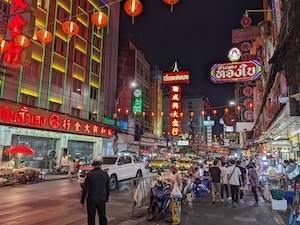
March 9, 2022 – Kristel, U.S. traveler: “My husband and I have been in Thailand since the start of 2022. In Bangkok, the typical hustle and bustle of the city feels similar to pre-covid days. Street food markets such as Chinatown is packed with both locals and foreigners while the temples are still fairly quiet depending on the time you visit.
With regards to restrictions, masks are still worn both indoors and outdoors and temperature checks are imposed when going into indoor spaces. Healthcare is easily accessible and rapid tests can be bought at a local 7-11 for very cheap. While a lot of restaurants have shut down, there are still plenty of good options and street food areas are staying busy and doing well. If visiting the islands, you can expect beautiful beaches without the crowds.”
February 11, 2022 – Abigail of I’m going on an adventure , British tourist: “My partner and I are currently travelling through Thailand for one month. We are in Phuket at the moment. Food and transport options are good with everything open and actually the area seems to have been revamped since a few years ago; its cleaner and better organised!
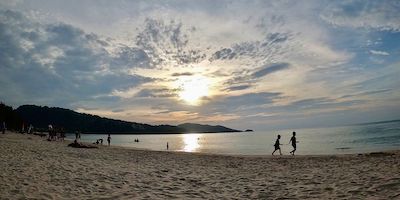
All areas are open and ready to receive guests. Face masks are still required to be worn however in the more populated tourist areas such a Patong no one seems to be using them as much. There is no contact tracing or daily testing required (except official PCR test). It’s always important to carry a face mask as some restaurants and activities will ask to have them on but in general the island so far has been very relaxed! The country still isn’t as busy as pre-covid which actually makes it an even better time to visit as it’s less crowded but there is still a nice holiday vibe.”
January 28, 2022 – Katy, American digital nomad: “ During our visit to Chiang Mai, we found that most businesses and restaurants in the Old Town area are open. Some are temporarily closed or have reduced hours, but enough were open that it wasn’t a problem. Bars are technically closed. Be aware that you can’t purchase alcohol at restaurants and stores after a certain time in the Chiang Mai province, I believe it’s 9pm now (but it keeps changing).
Travel restrictions are being followed closely by locals and visitors for the most part. Mask wearing and temperature checks are required at all businesses & shops and people do follow these rules. Contact tracing is also required (by scanning an app or signing a register), but we found that most people didn’t bother with this step.
The one exception is at the Chiang Mai Sunday market. Contact tracing (along with mask wearing and temperature scans) are firmly enforced there. Most of the Chiang Mai markets and walking streets are open, except for the Saturday Walking Street (which is closed) and the Night Bazaar (which is mostly closed and not worth visiting). There were some other foreigners in Chiang Mai but not many.
The city is used to having a larger number of tourists, so it didn’t feel too crowded and we didn’t have any issues with waiting in lines or securing tickets to popular attractions. Access to healthcare is easy and affordable in Chiang Mai (at least compared to what we’re used to in the United States). Booster shots are available to anyone (including foreigners) and you can get a PCR test for travel at the Chiang Mai Ram Hospital.”
January 2022 – Zoe Adventura , Australian: “ I moved to Thailand with my family in January 2022. The biggest difference between here and Australia is that everyone is expected to wear a mask all the time. Even children, and even while exercising. Most tourists don’t. Most people seem relaxed about everything, but occasionally we hear that the hospitals are full – which is pretty scary.
Travel restrictions – there are quite a few hoops to jump through to get to Thailand . We came for the Phuket Sandbox – which meant we had to book a 7 day stay in a government approved sandbox hotel, have a specific insurance paid for, and also get RT-PCR tests before travel, plus 2 more in the first week. During this week we were free to travel around Phuket. For us, it was actually pretty seamless.
Before entering Thailand you need to get a Thaipass, which can be a bit tricky, but there is plenty of information online about what you need to do. There are facebook groups which can help with any questions, and you can apply multiple times if you need.
As far as things being closed, the tourist areas of Phuket are completely different. Patong has restrictions on nightlife and alcohol service is restricted. A lot of shops are closed and boarded up in Patong, which is sad to see. On the other side of the island which typically has less tourism, it’s much less noticeable. That being said, the hotel we are currently staying in is clearly operating on skeleton staff, with half of the rooms empty. I’ve only seen 3-5 other guests, and it is a little creepy. The staff are obviously doing the best they can but the common areas are neglected. Same story in the last hotel we stayed in. All activities are cancelled, kids club is closed etc.”
December 2, 2021 – Katy, American digital nomad, A Rambling Unicorn : “My husband and I flew from Istanbul to Phuket on Nov. 27 and then will fly to Chiang Mai on Dec. 4 when our stay in the Sandbox is complete. We have Tourist Visas and will be in Thailand for 60 days.
I arrived at the Phuket Airport in November 2021 and was amazed at the thorough measures put into place for international arrivals. All passengers were initially seated in an arrivals hall in chairs that were spaced apart for social distancing. After a check of our documents by workers covered in full PPE, we were led through 5 different stations that verified our documents and administered a PCR test on-the-spot. We were glad we had printed all of our documents out in advance – including our Thai Pass, PCR Test results and SHA+ Hotel booking. Passengers without printed copies had to print them out at a special printing station.
Thai locals take COVID very seriously. Everyone wears masks in public, even when riding open-air motor scooters. Contact tracing is managed via the MorChana app which everyone is encouraged to download. We are staying in a remote part of Phuket where some restaurants are still closed and our hotel is only half full. We haven’t encountered any lines at restaurants or crowds in this part of the island, quite the opposite actually.
Thailand is really particular about the COVID insurance. When we first applied for the COE (this was the precursor to the Thai Pass), we tried to use our World Nomads insurance and it was rejected. I’ve heard anecdotally that they only accept COVID insurance from Thai companies. I don’t know if that is true and/or if things are relaxed now that they’ve moved to the Thai Pass. When we re-applied, we bought insurance through a Thai company that specialized in Thai Pass and Tourist Visa insurance. It came with document that clearly stated COVID was covered with a coverage of 50,000 USD.”
Thailand Reopening: Phuket Sandbox Updates video published October 29 2021 See what it’s like in Phuket, with commentary from local Thai people in the tourism industry as well as recent travelers to Phuket:
Planning a trip to Thailand?
Check out our other Thailand travel resources: – Things We Would (and Wouldn’t) Do Again in Chiang Mai, Thailand – Bangkok Tourist Pass Review and Suggested Itineraries – Review: Kindred Spirit Elephant Sanctuary + Hill Tribe Homestay – Tips for Travel in Bangkok
If you have questions or updates about travel to Thailand during the Coronavirus crisis or post-pandemic, please let us know in the comments below.
~ Pin this post for later or share with friends ~
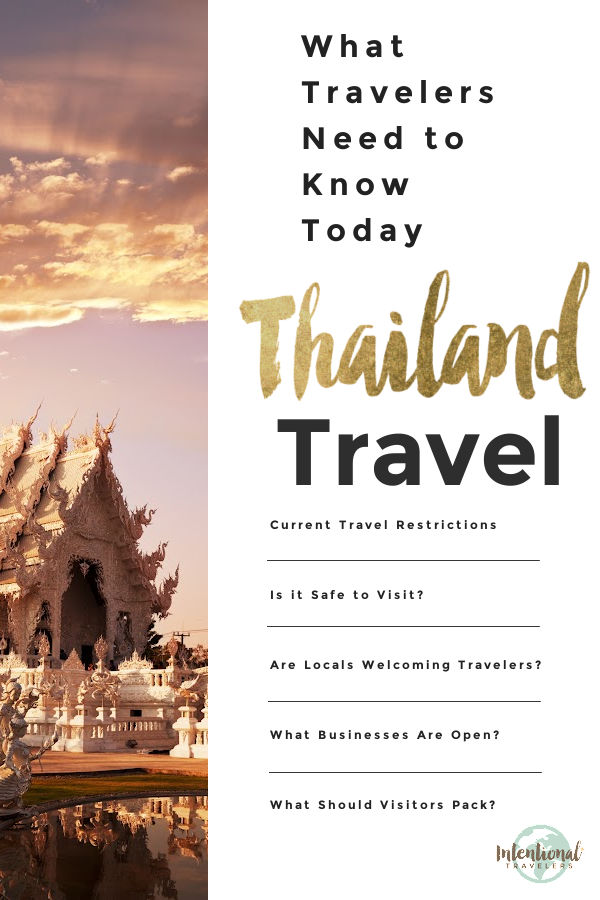
Disclaimer: Please note, travel restrictions change frequently. Readers must take responsibility for verifying information through official sources like the State Department and CDC, in respect to their specific situations. No responsibility can be accepted by Intentional Travelers for action or inaction as a result of information provided through IntentionalTravelers.com. Any information provided here is issued as general information only.
Similar Posts
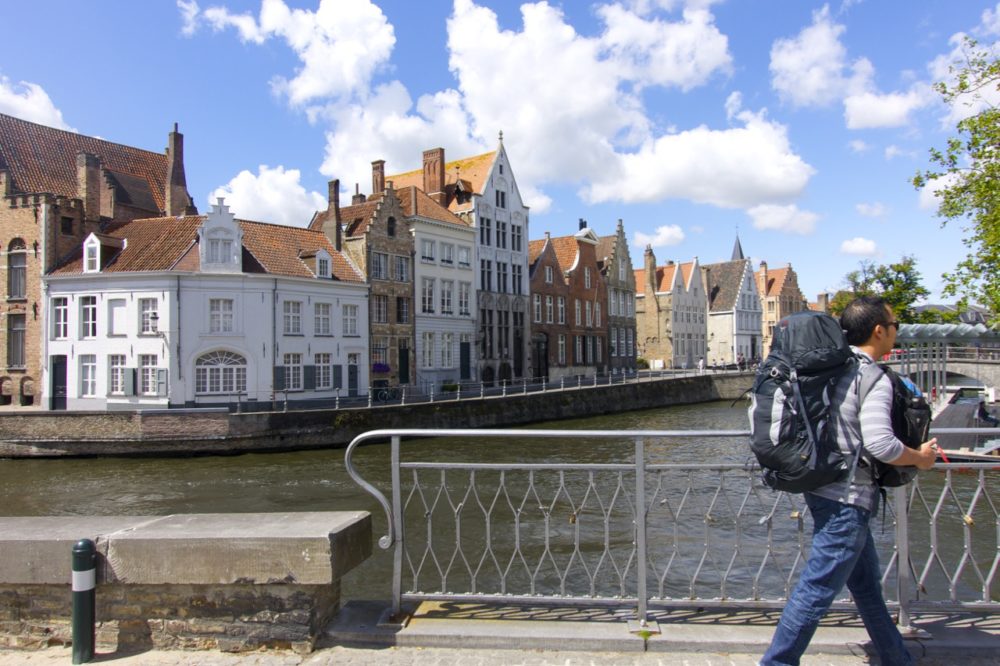
10+ Items We Take With Us on Every Trip
We pack and re-pack our bags a lot as Digital Nomads. Typically, we travel with a backpack and laptop bag each; or a rolling carry-on suitcase and a laptop bag. Our trips can be a house-sitting gig just a few miles away, to visiting our Peace Corps community in Jamaica, or country hopping around Europe…

Merida Mexico travel requirements 2024: What travelers need to know
We aim to keep this post updated about Merida Mexico travel in 2024 with official Yucatan travel restrictions, requirements, and health and safety guidance. Our goal is to help you make informed decisions so you can travel confidently, safely, and responsibly in this new post-pandemic world of ours. The Covid situation in Merida, Mexico is…

Our Ultimate Trip Wish List: 10 Travel destinations we dream of
It seems that every time we travel, wanderlust kicks in and our list of places to visit only gets longer! As digital nomads, we are fortunate to visit new destinations around the world each year. Honestly, we are content and don’t feel that there’s any one particular place that’s eluding us. There’s nowhere we have…
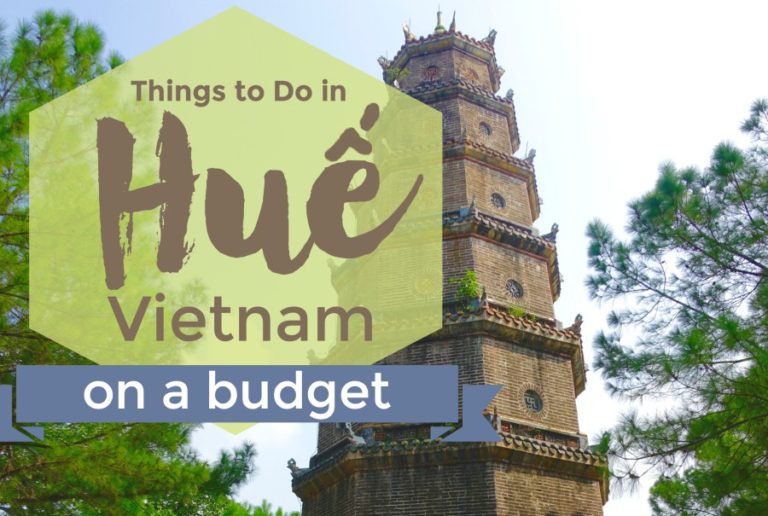
What to Do in Huế, Vietnam on a Budget
Huế can be a great stop for travelers on a central Vietnam itinerary. In this post, we’ll cover the best things to do in Hue, where to stay, and what to eat on a budget. Visiting Hue, Vietnam Once the national capitol and home to the royal Nguyen family, much of the Imperial City was…
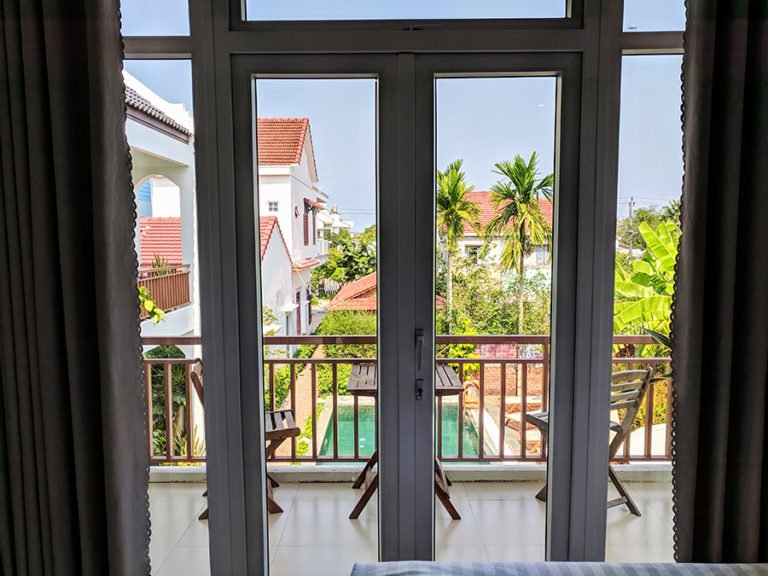
The Complete Guide for Where to Stay in Hoi An Vietnam (2024)
Many first time visitors wonder where to stay in Hoi An, Vietnam. The accommodation options are countless. And a wise choice of hotel or homestay can greatly enhance your trip to Hoi An. Here’s a real example: Some friends of ours booked their first stay in Hoi An at a house near the beach. They…
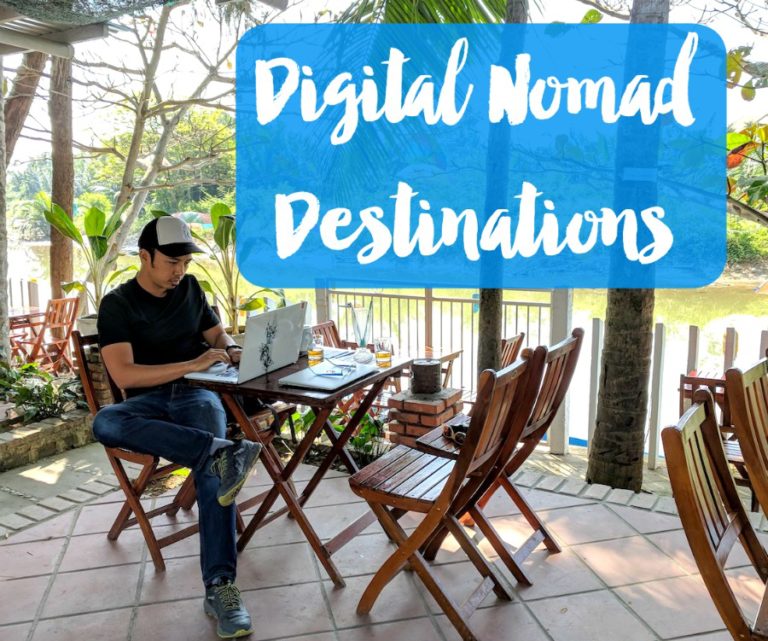
Off-the-beaten-path Small Town Digital Nomad Destinations
If you’re like us, finding the best small town destinations and off-the-beaten-path gems is a big reason why we love working remotely. Since becoming digital nomads in 2014 and trying out various places to live and work abroad, we’ve learned an important lesson: Some of the big “digital nomad hubs” are not really our style….
Leave a Reply Cancel reply
Your email address will not be published. Required fields are marked *
This site uses Akismet to reduce spam. Learn how your comment data is processed .
9 things you should know before visiting Bangkok

Apr 25, 2024 • 6 min read
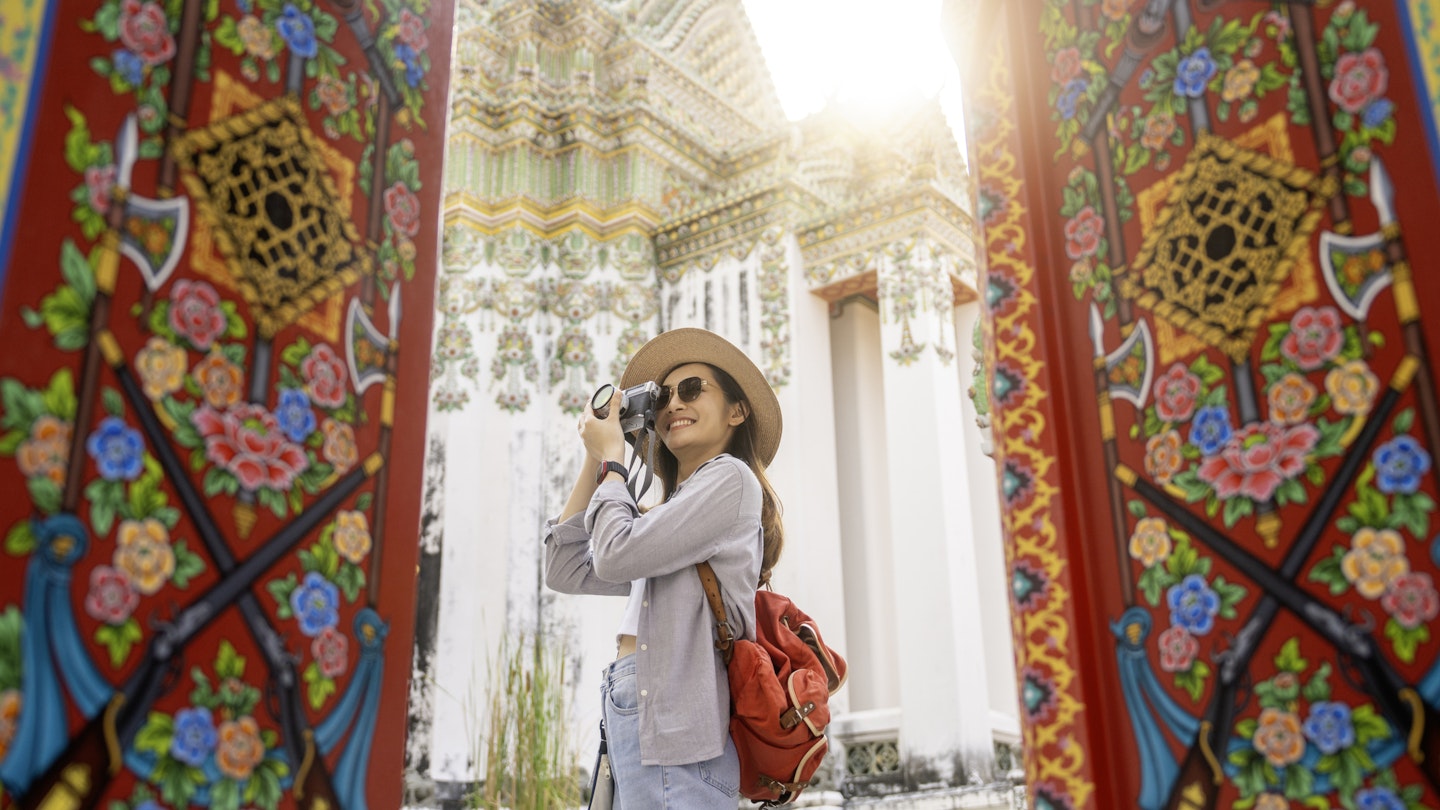
Make the most of your time in bustling Bangkok with our 9 insider tips © Witthaya Prasongsin / Getty Images
I moved to Bangkok in 1999, a time when most visitors to Thailand reluctantly did a night in this megacity before beelining to an island or the north. Synonymous with traffic jams, pollution and urban sprawl, the Thai capital was largely seen as an unwanted but obligatory stopover.
Decades later, things have changed and Bangkok is now the destination of choice for many visitors – with good reason. Easier to get around and cleaner than ever, with a vibrant eating and drinking scene that caters to just about every budget and an enviable spread of intriguing sights and fantastic-value shopping, the city has more to offer than ever before.
Yet like any big city, Bangkok has its quirks and surprises. Here's what you need to know before you go.
Find out what you should know in advance about Thailand , including important cultural, religious and legal issues, etiquette and health.
Bangkok is easier to get around than ever
Bangkok used to be synonymous with traffic jams and air pollution. The jams still happen, but the good news is that the city’s public transportation system has grown immensely. The various above and underground rail networks currently unite 10 different lines – with more in the works – and 192 stations, including trains linking both of Bangkok’s international airports and the city center.
On top of this, taxis remain ubiquitous and cheap – though subject to the issues that make the city’s traffic so infamous – while quirky public transportation systems such as the city’s river and canal taxis provide a slow but steady (and scenic) way to get around.
Crime happens but it's rare
Thailand has a low crime rate and is generally considered a safe country. Bangkok suffers from the same type of violent crimes as any big city, but anecdotally, is considered a safe place. Apart from occasional bag snatching and theft, the most dangerous thing in the city is its traffic (Thailand’s roads are some of the deadliest of any country). Solo women travelers and locals I’ve spoken to also report feeling safe in the city.
A particular Bangkok annoyance is scams directed at tourists. These typically involve taxi drivers who refuse to use their meters, or tuk-tuk drivers and/or well-dressed, English-speaking men who appear out of nowhere offering free tours that inevitably lead to dodgy gem shops or tailors. The good news is that most of these situations are easy to spot and relatively low-pressure; if something seems off, simply walk away.
It’s also worth noting that Bangkok’s police don’t have a great reputation. Steer clear of them unless you really need help.
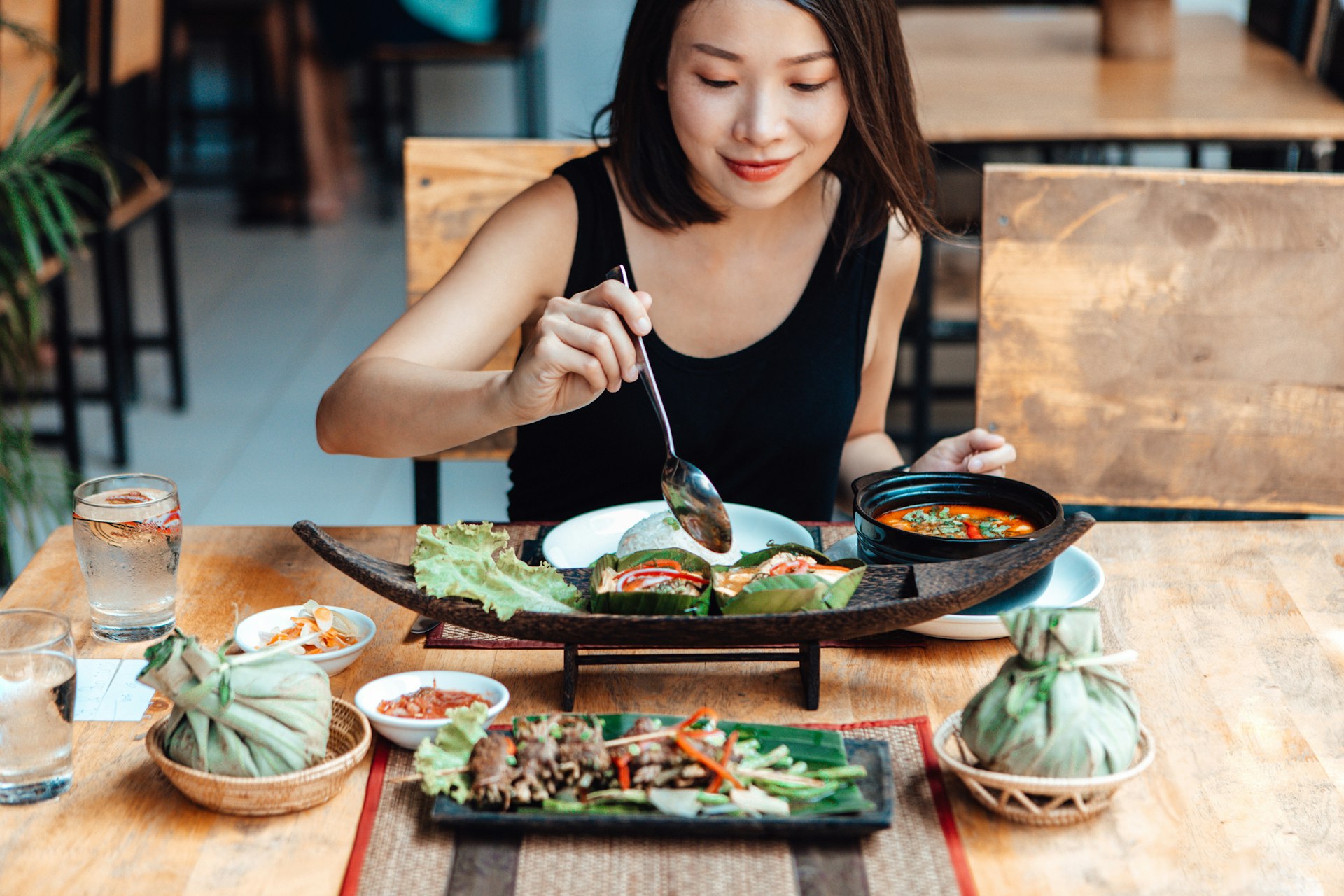
Street food isn’t the only good food
Western chefs and food media have been raving about Bangkok’s street food for more than a decade. And it’s a fun, often delicious way to eat. But if you relegated yourself to street food alone, you’d miss the entire scope of Bangkok’s cuisine.
Supplement those streetside noodles with meals at the charming, decades-old restaurants in the old town – these are the places that get the most praise in the Thai-language media. In Bangkok’s newer districts, such as along Thanon Sukhumvit, consider a Japanese meal – the city is home to one of the largest populations of Japanese people outside of Japan.
If your budget allows, consider a splurge restaurant. While the rest of the world was obsessing over its street food, Bangkok's dining scene went in the opposite direction and today is home to several modern, cutting-edge upscale restaurants.
Sometimes it's too hot to handle
Bangkok is one of the hottest capital cities in the world, with an average mean temperature of 29°C (84°F). This heat is compounded by intense humidity and the urban environment, which reflects and retains heat, meaning the city often feels much, much ( much ) hotter. April is Bangkok's hottest month, with an average daily max temperature of 35°C (96 ° F) and during the “winter” in December and January, temperatures rarely dip below 20°C (68°F).
All of this means you shouldn't try to cover too much ground on foot – an already difficult task given the city’s lack of pedestrian infrastructure. If you do walk, learn the technique of regularly ducking into air-conditioned malls, hotel lobbies and 7-Elevens to cool off.
Likewise, pack light clothing, but remember – Thais are conservative when it concerns showing skin in public and Bangkok is not the beach.
Bangkok is a queer-friendly city
LGBTIQ+ people are made to feel welcome in Bangkok, which is generally considered Asia’s most queer-friendly city. The epicenter of the gay scene is Thanon Silom, especially in and around Soi 4, which is ostensibly Asia’s biggest queer nightlife area.
Thankfully, it looks like this queer-friendly vibe will extend to legislation. In 2023, the Thai parliament passed draft bills on same-sex marriage, which are expected to become laws, making Thailand the first country in Southeast Asia to allow same-sex marriage.
Keep in mind that public displays of affection between people of any gender are frowned upon in Thailand.
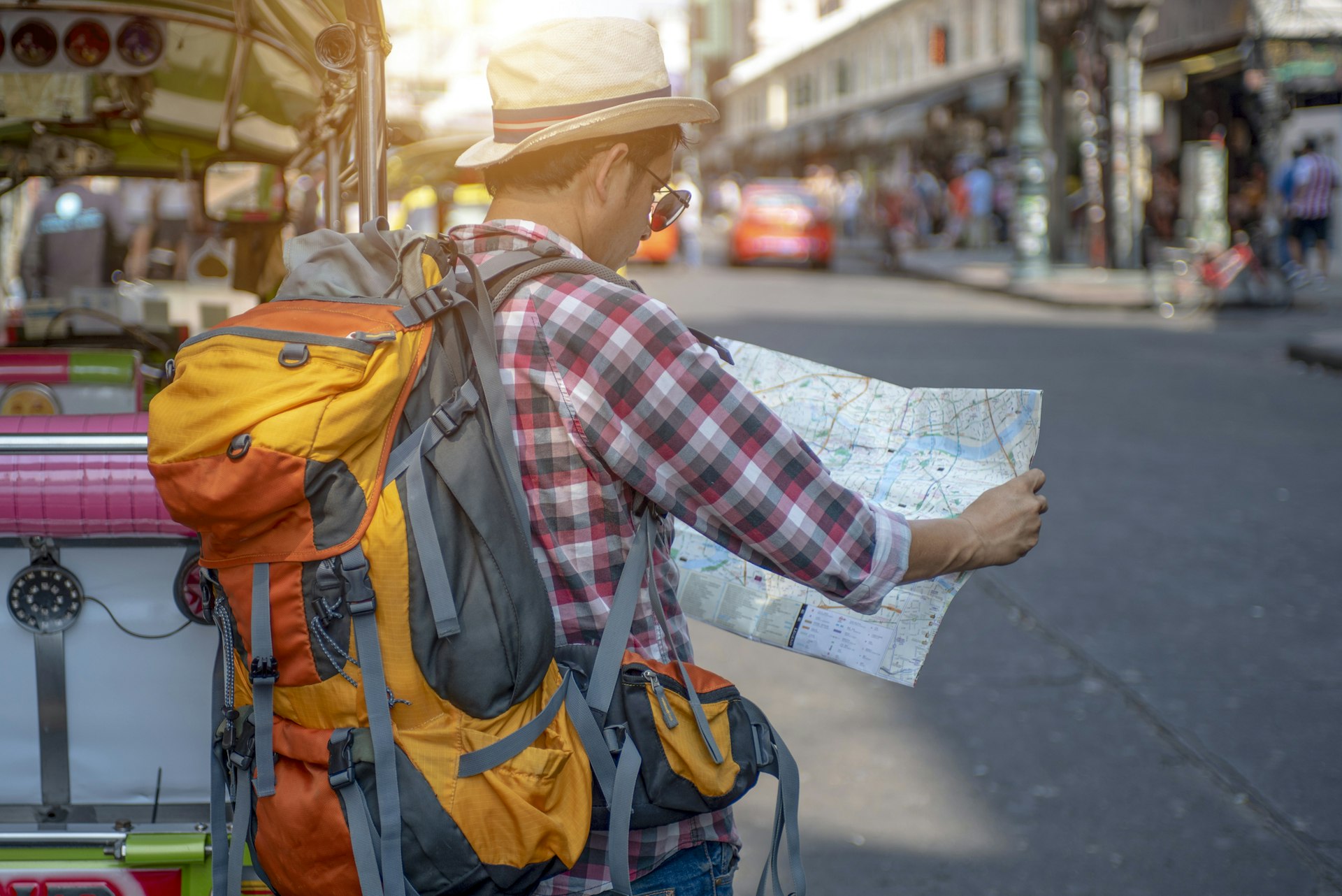
There are better budget options than Khao San Road
If you want to be based in the world’s most famous backpacker strip – and all that that entails – book a bed or room on Thanon Khao San, generally known as Khao San Road. It’s lively and fun, and provides easy access to the city’s old town.
But having moved slightly upscale in recent decades, Khao San Road no longer represents the best value area to stay in Bangkok. And with loud bars and a boozy vibe, it’s definitely not the most peaceful place to stay.
If you want to have access to the backpacker amenities but don’t want the noise and hassle, consider staying in the streets nearby, such as Thanon Rambutri or Thanon Phra Athit.
Monsoon season brings sudden surprises
During the annual monsoon, from approximately May to October, Bangkok’s streets occasionally turn into rivers. During this time of year, don’t be surprised if you have to camp out on an elevated street corner or in a 7-Eleven until the waters recede.
Malls are part of city life
While shopping malls are a dying breed in much of the west, they’re thriving in Bangkok. The city is home to some of the most over-the-top shopping centers in the world, which in contemporary Bangkok, have a dual function as (conveniently air-conditioned) social centers. Thais gather at the city’s more than 500 shopping centers to chat, eat, take selfies and occasionally make purchases, and so should you.
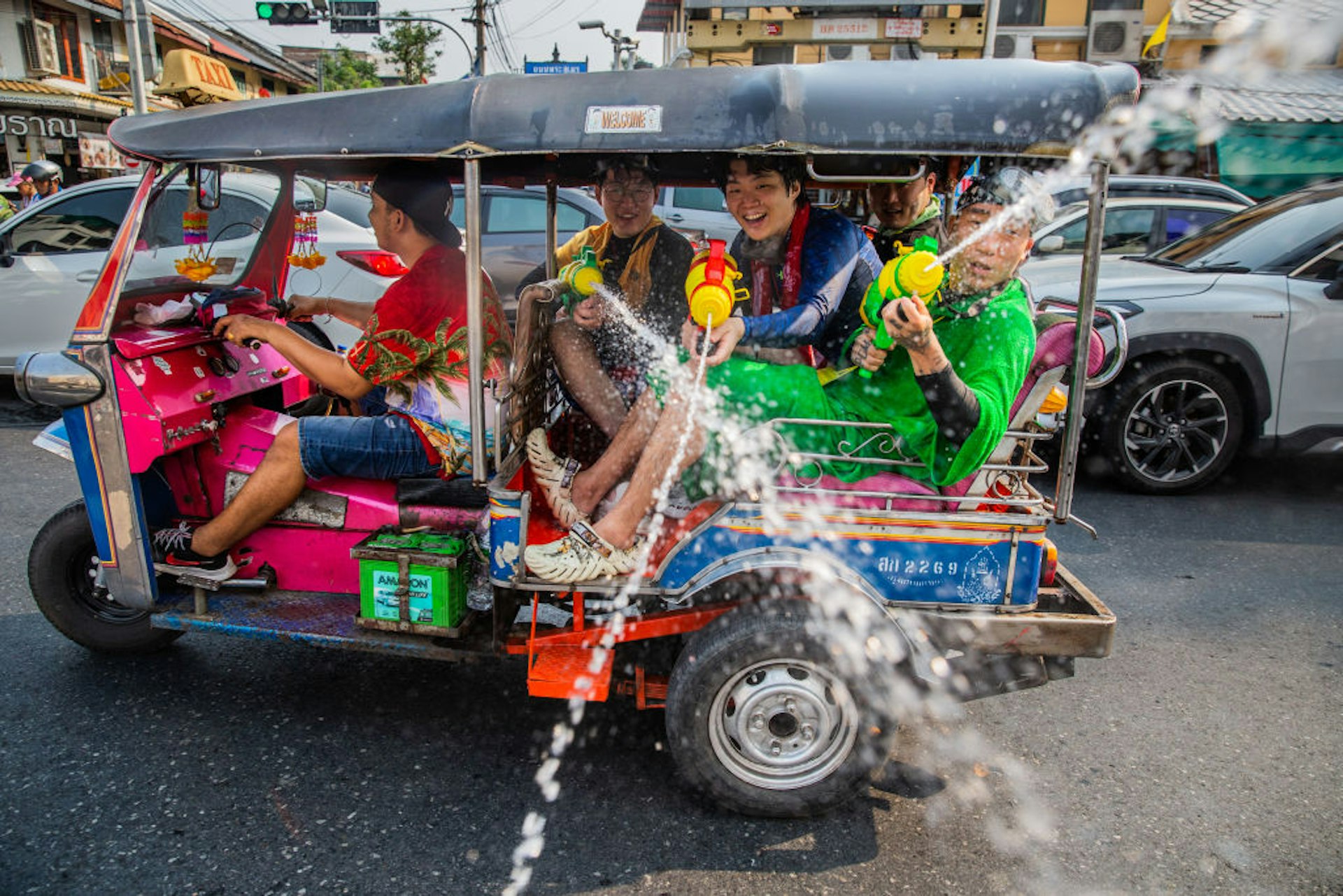
Bangkok essentially shuts down during the Thai New Year
Every year around April, Bangkok grinds to a halt during Thai New Year, known as Songkran or the water festival. The tradition has its origins in the cleansing role of water, but these days it essentially means that Bangkok becomes ground zero to a multi-day, raucous water battle.
Whether you're into it or not, you’ll be splashed with water and/or smeared with baby powder. Don’t even attempt stepping outside your door with your Sunday best on and don’t expect your favorite restaurant, or that museum or monument to be open (shopping centers, inevitably, will be operating). Discover more about Bangkok's festivals and seasonal attractions in our guide to the best time to visit the city .
Weed isn’t exactly legal in Bangkok
In June 2022, marijuana and hemp were removed from the Category 5 narcotics list in Thailand. However, there are still many restrictions and smoking marijuana in public is not legal and is not recommended.
Yes, there's a sex industry, but it's easy to avoid
“One Night in Bangkok” is indeed a reality. But if you steer clear of the main red-light zones at night – namely Thanon Patpong, Soi Nana and Soi Cowboy – it's likely you won’t even witness this side of the city.
Explore related stories
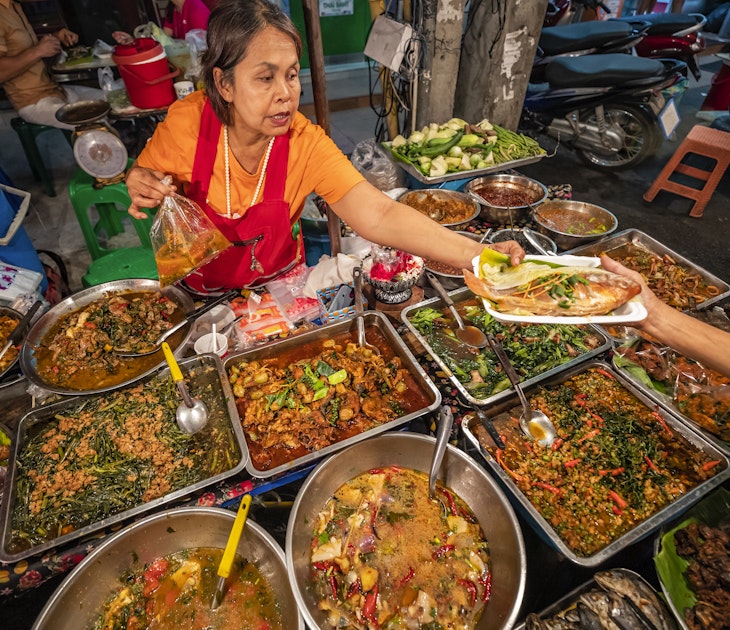
Tips & Advice
Apr 28, 2024 • 6 min read
Find out how to make your bhat stretch further with these budget travel tips for Chiang Mai, Thailand's “Capital in the North.”
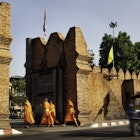
Apr 19, 2024 • 7 min read

Apr 8, 2024 • 6 min read
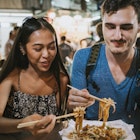
Feb 23, 2024 • 7 min read

Jan 5, 2024 • 20 min read

Jan 3, 2024 • 5 min read
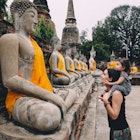
Dec 16, 2023 • 9 min read

Dec 5, 2023 • 8 min read

Nov 27, 2023 • 7 min read
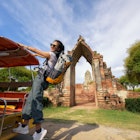
Oct 28, 2023 • 10 min read
Cookies on GOV.UK
We use some essential cookies to make this website work.
We’d like to set additional cookies to understand how you use GOV.UK, remember your settings and improve government services.
We also use cookies set by other sites to help us deliver content from their services.
You have accepted additional cookies. You can change your cookie settings at any time.
You have rejected additional cookies. You can change your cookie settings at any time.
- Passports, travel and living abroad
- Travel abroad
- Foreign travel advice
Warnings and insurance
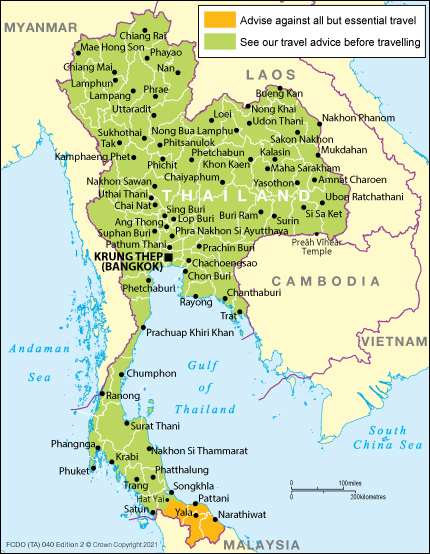
The Foreign, Commonwealth & Development Office ( FCDO ) provides advice about risks of travel to help British nationals make informed decisions. Find out more about FCDO travel advice .
Areas where FCDO advises against travel
Your travel insurance could be invalidated if you travel against FCDO advice. Consular support is also severely limited where FCDO advises against travel.
Pattani province
FCDO advises against all but essential travel to Pattani province.
Yala province
FCDO advises against all but essential travel to Yala province.
Narathiwat province
FCDO advises against all but essential travel to Narathiwat province.
Southern Songkhla province
FCDO advises against all but essential travel to Southern Songkhla province, except for:
- the areas north of and including the A43 road between Hat Yai and Sakom
- the areas north-west of the train line which runs between Hat Yai and Padang Besar
Hat Yai to Padang Besar train line
FCDO advises against all but essential travel on the Hat Yai to Padang Besar train line.
Find out more about why FCDO advises against travel .
Before you travel
No travel can be guaranteed safe. Read all the advice in this guide as well as support for British nationals abroad which includes:
- advice on preparing for travel abroad and reducing risks
- information for women, LGBT+ and disabled travellers
Follow and contact FCDO travel on Twitter , Facebook and Instagram . You can also sign up to get email notifications when this advice is updated.
Travel insurance
If you choose to travel, research your destinations and get appropriate travel insurance . Insurance should cover your itinerary, planned activities and expenses in an emergency.
Related content
Is this page useful.
- Yes this page is useful
- No this page is not useful
Help us improve GOV.UK
Don’t include personal or financial information like your National Insurance number or credit card details.
To help us improve GOV.UK, we’d like to know more about your visit today. We’ll send you a link to a feedback form. It will take only 2 minutes to fill in. Don’t worry we won’t send you spam or share your email address with anyone.

Search Smartraveller

Latest update
Exercise a high degree of caution in Thailand overall due to security and safety risks.
Higher levels apply in some areas.
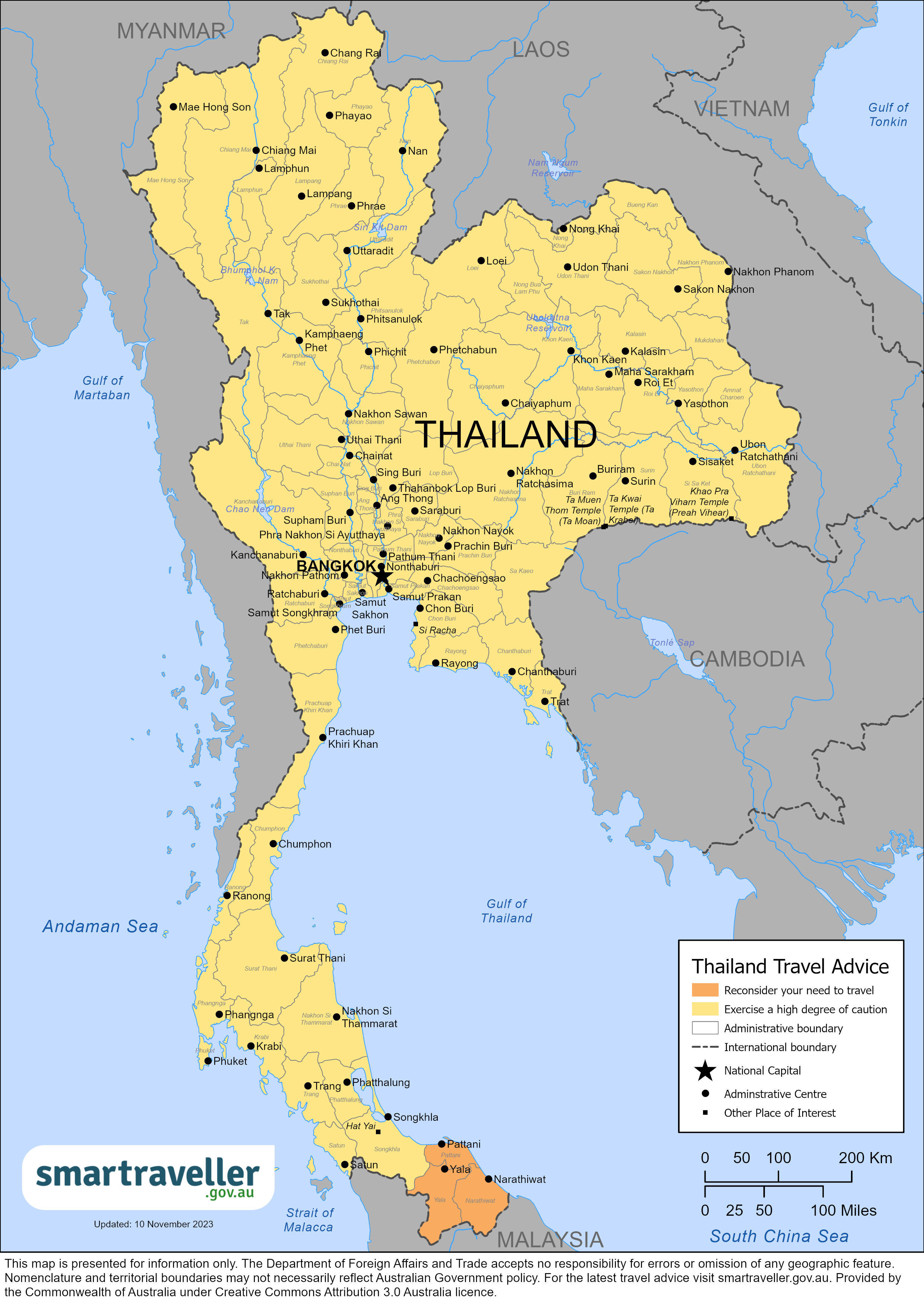
Thailand (PDF 998.61 KB)
Asia (PDF 2.21 MB)
Local emergency contacts
Fire and rescue services, medical emergencies.
Call 1669 for medical emergencies and rescue services.
Call 1724 for an ambulance in Bangkok. 1669 Nationwide.
Call 191 for police.
Call 1155 for the tourist police.
Advice levels
Exercise a high degree of caution in Thailand overall due to security and safety risks.
Reconsider your need to travel to Yala, Pattani and Narathiwat provinces.
Reconsider your need to travel to:
- Yala province,
- Pattani province, and
- Narathiwat province
due to ongoing risks of low-level insurgent activity, including terrorism.
See Safety .
- Road accidents are a significant cause of injury. Be alert at all times on the roads.
- Floods and severe weather can disrupt essential services during the wet season (June to November). Follow the advice of local officials.
- Scams, credit card fraud and ATM fraud are common.
- Sexual assault, assault, robbery and drink spiking can happen to tourists. Never leave your drink unattended. Stay with people you trust at parties, in bars, nightclubs and taxis.
- Anti-government protests have previously occurred in Bangkok and other areas of Thailand. The security environment can be unpredictable and turn violent. Those attending protests can face arrest or other legal consequences. Monitor local media for information on protest locations and avoid public gatherings. Take official warnings seriously and follow the advice of local authorities.
- There's an ongoing risk of terrorist attack in Thailand. Popular tourist areas may be the target of terrorist attacks. Thai authorities have warned of possible bombings on symbolic dates or holidays. Be alert to possible threats. Take official warnings seriously and follow the advice of local authorities.
- Reconsider your need to travel to the 3 most southern provinces of the Thailand-Malaysia border: Yala, Pattani and Narathiwat. Low-level insurgent activity continues to occur in these areas.
- Border areas near Cambodia, Myanmar and Malaysia are dangerous due to violence, armed conflict and landmines. Pay close attention to your personal security.
Full travel advice: Safety
- Travellers have been arrested for carrying medicine they bought at a Thai pharmacy without a prescription. Get medical advice before buying medicine.
- Insect-borne diseases include malaria, Zika virus, dengue, chikungunya, Japanese encephalitis and filariasis. Use insect repellent. Ensure your accommodation is insect-proof as possible.
- Animals in parts of Thailand can carry rabies. Don't ever feed, pat or tease monkeys. If you're bitten or scratched by a dog, monkey or other animal, get treatment immediately.
- Thailand has high levels of air pollution. Air pollution can make bronchial, sinus or asthma conditions worse. Check air quality levels on the World Air Quality Index .
- Medical tourism is common. Avoid discount and uncertified medical establishments. Their standards can be poor. Research medical service providers and choose with care.
Full travel advice: Health
- Penalties for drug offences are severe. They include the death penalty.
- Commercial surrogacy is illegal. E-cigarettes, e-baraku, vaporisers and refills are illegal. Smoking on some beaches is illegal. Travel without carrying identification is illegal.
- Penalties for breaking the law can apply to anyone aged under 18 years. Penalties for children can include detention in a juvenile or adult prison.
- Thailand has the death penalty for serious crimes, including murder, attempted murder and rape. Crimes against the state and offences against the monarchy can also attract the death penalty. Take care not to cause offence about the monarchy, including on social media.
Full travel advice: Local laws
You can get a visa exemption for up to 30 days on arrival (restricted to 2 entries per calendar year). The visa exemption is strictly for tourism purposes only. If your travel is not for tourism purposes, contact the nearest Royal Thai Embassy or Consulate-General to apply for the appropriate visa.
- You may be subject to biometric screening at points of entry, and restrictions may change at short notice. Check with your airline, the International Air Transport Association (IATA) or the nearest Thai Embassy for the latest information.
- You can transit between international flights in Bangkok's Suvarnabhumi Airport . Ensure that your connecting flight is booked on the same itinerary and ticket. You must remain in the transiting area in the airport.
Full travel advice: Travel
Local contacts
- The Consular Services Charter tells you what the Australian Government can and can't do to help when you're overseas.
- For consular help, contact the Australian Embassy, Bangkok , or the Australian Consulate-General, Phuket .
- To stay up to date with local information, follow the Embassy's social media accounts.
Full travel advice: Local contacts
Full advice
Civil unrest and political tension, security situation .
The security situation can be unpredictable in Thailand. Large protests have occurred in Bangkok and other areas. In previous years, large political protests and government crowd control operations have resulted in violence.
More incidents are possible.
To stay safe during periods of unrest:
- avoid demonstrations, processions and public gatherings
- follow media and other sources
- take official warnings seriously
- follow the advice of local authorities
- If you see a suspicious package, stay clear and report it to Police
More information:
- Demonstrations and civil unrest
Thailand-Cambodia border
Thailand and Cambodia have an ongoing border dispute. There's a risk of landmines and unexploded weapons near the Thai-Cambodian border area.
Be extra careful at tourist areas, including:
- the Preah Vihear temple - Khao Pra Viharn in Thailand
- the Ta Kwai temple - Ta Krabei in Cambodia
- the Ta Muen Thom temple - Ta Moan in Cambodia
Tourist attractions and border crossings in this area may close with little or no notice.
Thailand-Myanmar border
Fighting and armed theft can occur along the Thai-Myanmar border. This includes:
- fighting between the Burmese military and armed ethnic opposition groups
- clashes between Thai security forces and armed criminal groups, such as drug traffickers
Armed clashes between the military and opposition groups inside Myanmar may lead to border closures.
If you try to cross the border illegally, you may be detained and deported.
Bandits may target you if you travel through national parks in this border region.
If you travel to this region:
- monitor the news
- watch out for other signs of unrest
- pay close attention to your personal security
Thailand-Malaysia border
Reconsider your need to travel to or from the three most southern provinces:
Violence includes attacks and bombings, with deaths and injuries. Since 2004, over 6500 people have been killed and many more injured in these provinces.
Bombings are often coordinated to target people who respond to the first explosion.
Over the past few years, multiple coordinated explosions have occurred in the southern border provinces, and low-level insurgent activity continues.
If you travel to or stay in these provinces, you could get caught up in violence directed at others.
Attacks can happen at any time.
Terrorism is a threat worldwide.
Attacks, including bombings and shootings, are possible anytime. They can happen anywhere, including Bangkok and Phuket.
Popular tourist areas may be the target of terrorist attacks.
Thai authorities have warned of possible bombings on symbolic dates or holidays.
Possible targets for future attacks include:
- shopping malls, markets and banks
- hotels and beach resorts
- restaurants, bars and nightclubs
- schools and places of worship
- outdoor recreation events
Other targets include public buildings, public transport, airports and sea ports.
To reduce your risk of being involved in a terrorist attack:
- have a clear exit plan in case there's a security incident
- be alert to possible threats
- report suspicious activity or items to police
- monitor the media for threats
If there is an attack, leave the area as soon as it's safe. Avoid the affected area in case of secondary attacks.
Gun-related violence can occur at any time.
On 3 October 2023, 3 people were killed and 4 injured in a shooting at the Siam Paragon mall in Bangkok.
On 6 October 2022, 36 people were killed in a shooting and stabbing incident in Nong Bua Lamphu province.
Sexual assault and violent crime
Travellers may experience sexual assault , other assault and robbery .
Be extra careful in tourist spots such as Khao San Road in Bangkok and the night-time entertainment zones in Bangkok, Pattaya and Phuket.
Be aware of drink-spiking. Don't drink homemade or local cocktails. They can contain narcotics or poison. You're at higher risk of sexual assault and theft if you get drugged.
Never leave your drink unattended.
Stay with people you trust at parties, in bars, nightclubs and taxis.
Get urgent medical attention if you think you or someone else has been drugged.
If you're a victim of violent crime, including rape, get immediate medical attention.
Under Thai law, courts will only accept the results of a medical examination from some government hospitals. After you've been examined by a government hospital, you can receive medical attention at a private hospital. Please contact the Australian Embassy Bangkok, Consulate-General Phuket, or Consular Emergency Centre in Canberra for assistance.
- Partying safely
Petty crime
Money and passports have been stolen from budget hotel and hostel rooms, and from bags on public transport. Thieves also target luggage stored on trains and below buses.
Bags have been snatched by thieves on motorcycles or sliced open with razor blades.
To reduce your risk of theft:
- don't leave valuables in luggage stowed under buses or away from you on trains
- be wary of motorcycles approaching from behind as you walk on the footpath
- hold bags and backpacks in front of you
Cyber security
You may be at risk of cyber-based threats during overseas travel to any country. Digital identity theft is a growing concern. Your devices and personal data can be compromised, especially if you're connecting to Wi-Fi, using or connecting to shared or public computers, or to Bluetooth.
Social media can also be risky in destinations where there are social or political tensions or laws that may seem unreasonable by Australian standards. Travellers have been arrested for things they have said on social media. Don't comment on local or political events on your social media.
More information:
- Cyber security when travelling overseas
Kidnapping
Kidnapping can happen anywhere, anytime, including in destinations that are typically at lower risk.
The Australian Government's longstanding policy is that it doesn't make payments or concessions to kidnappers.
- Kidnapping
Tours and adventure activities
Transport and tour operators don't always follow safety and maintenance standards. This includes for:
- scuba diving
- elephant safaris
- bungee jumping
If you plan to do an adventure activity :
- check if your travel insurance policy covers it
- ask about and insist on minimum safety requirements
- always use available safety gear, such as life jackets or seatbelts
If proper safety equipment isn't available, use another provider.
Climate and natural disasters
Thailand experiences natural disasters and severe weather , including:
- earthquakes
Severe weather events are likely to disrupt transport, electricity and communications.
To stay safe during severe weather:
- check media and weather reports
- check in with your tour operator
- don't enter areas affected by flooding or landslides
If there is a natural disaster:
- secure your passport in a safe, waterproof place
- keep in contact with friends and family
- monitor the media and other local sources of information
- Register with the Global Disaster Alert and Coordination System to receive alerts on major disasters.
Storms and floods
Severe storms and widespread seasonal flooding can occur without warning. This includes flash floods.
The wet season in north and central Thailand is from May to October.
In Koh Samui and the south-east of the peninsula, the wet season is from November to March.
- Thai Meteorological Department
- Mekong River Commission — flood levels for the Mekong River
Earthquakes and tsunamis
Earthquakes occur in Thailand.
Tsunamis are more likely in Thailand because of the risk of earthquakes.
Check with the US Tsunami Warning Centre for updates on seismic activity and tsunamis.
If you're near the coast, move to high ground straight away if advised, or if you:
- feel a strong earthquake that makes it hard to stand up
- feel a weak, rolling earthquake that lasts a minute or more
- see a sudden rise or fall in sea level
- hear loud and unusual noises from the sea
Don't wait for official warnings such as alarms or sirens. Once on high ground, monitor local media.
Travel insurance
Get comprehensive travel insurance before you leave.
Your policy needs to cover all overseas medical costs, including medical evacuation. The Australian Government won't pay for these costs.
If you can't afford travel insurance, you can't afford to travel. This applies to everyone, no matter how healthy and fit you are.
If you're not insured, you may have to pay many thousands of dollars up-front for medical care.
- what activities and care your policy covers, including in terms of health and travel disruptions
- that your insurance covers you for the whole time you'll be away
Physical and mental health
Consider your physical and mental health before you travel, especially if you have an existing medical condition.
See your doctor or travel clinic to:
- have a basic health check-up
- ask if your travel plans may affect your health
- plan any vaccinations you need
Do this at least 8 weeks before you leave.
If you have immediate concerns for your welfare or the welfare of another Australian, call the 24-hour Consular Emergency Centre on +61 2 6261 3305 or contact your nearest Australian Embassy, High Commission or Consulate to discuss counselling hotlines and services available in your location.
- General health advice
- Healthy holiday tips (Healthdirect Australia)
Not all medication available over the counter or by prescription in Australia is available in other countries. Some may even be considered illegal or a controlled substance, even if prescribed by an Australian doctor.
If you plan to bring medication, check if it's legal in Thailand. Take enough legal medicine for your trip.
Get medical advice before buying medicine in Thailand. Travellers have been arrested for carrying medicine they bought at a Thai pharmacy without a prescription.
Carry a copy of your prescription or a letter from your doctor stating:
- what the medication is
- your required dosage
- that it's for personal use
- Medications
Health risks
Insect-borne illnesses.
Zika virus is a risk in Thailand. If you are pregnant, defer non-essential travel to affected areas. Speak to your doctor before you travel. Several cases have been reported, including in Bangkok.
The Department of Health and Aged Care's Zika virus bulletin has advice for all travellers on how to reduce Zika virus risks. There's no vaccine for Zika virus.
Malaria is a risk throughout the year in rural areas. The worst affected areas are near the borders with Cambodia, Laos and Myanmar.
Dengue occurs in Thailand. It's common during the rainy season:
- November to March in Koh Samui and the south-east of Thailand
- May to October in the rest of Thailand, including Phuket
Dengue peaks in July and August although it is prevalent throughout the year. There's no vaccine or specific treatment for dengue.
Other insect-borne diseases include:
- chikungunya
- Japanese encephalitis
To protect yourself from disease:
- make sure your accommodation is insect-proof
- use insect repellent
- wear long, loose, light-coloured clothing
- consider taking medicine to prevent malaria
- get vaccinated against Japanese encephalitis
- Infectious diseases
Animals in parts of Thailand can carry rabies .
Rabies is deadly. Humans can get rabies from mammals, such as:
- other animals
Don't ever feed, pat or tease monkeys, even if you're encouraged to.
If you're bitten or scratched by a dog, monkey or other animal, get treatment as soon as possible.
Smoke haze and air pollution
Thailand has high levels of air pollution. It can reach hazardous levels. Bangkok and Chiang Mai can be particularly bad.
Air pollution can make bronchial, sinus or asthma conditions worse.
Smoke haze is an issue across the north and north-east of Thailand from March to April.
Check air quality levels on the World Air Quality Index .
Get advice from your doctor before you travel.
Medical care
Medical facilities.
The standard of medical facilities varies.
In an emergency, we recommend you contact an ambulance on 1669.
Private hospitals in major cities have high standards of medical care. Services can be limited in other areas.
Hospitals and doctors often need to confirm your insurance before they'll treat you, even in an emergency. Otherwise you may need to pay cash up-front. Costs can be very high.
Hospitals in Bangkok and other large cities can treat serious illnesses and accidents. In other areas, you may need to be moved to a place with better facilities. Medical evacuation can be very expensive.
Decompression chambers are located near popular dive sites in:
Medical tourism
Medical tourism , including for cosmetic and sex-change operations, is common.
Standards at discount and uncertified medical establishments can be poor. Serious and life-threatening complications can result.
Some hospitals and clinics have refused to compensate patients:
- who aren't satisfied with the results of cosmetic surgery
- who are harmed during surgery
- who die during surgery
Do your research. Choose your medical service providers with care.
Don't use discount or uncertified medical service providers.
You're subject to all local laws and penalties, including those that may appear harsh by Australian standards. Research local laws before travelling.
If you're arrested or jailed , the Australian Government will do what it can to help you under our Consular Services Charter . But we can't get you out of trouble or out of jail.
Penalties for drug offences are severe. They include the death penalty.
Possession of even small quantities of drugs for recreational purposes can lead to long jail sentences and deportation.
Thai authorities may conduct spot-checks for illegal drugs in tourist areas.
Travellers have been targeted for narcotic tests. Under Thai law, authorities have the right to demand urine samples from people suspected of taking illegal drugs.
If you're asked to submit a urine sample, ask to do it at a police station. You can also ask to contact the Tourist Police. Call 1155 for English-speaking officers.
Private recreational use of cannabis is legal if the THC content is below 0.2% in weight. Cannabis use in public places remains illegal, and smoking outside is considered a public nuisance, and offenders risk fines and arrest. It is still illegal to sell or supply any extracts of cannabis containing more than 0.2% of THC.
While cannabis is decriminalised in Thailand, be aware of the next destination you are travelling to, where it may be illegal, including when transiting. This may include residual amounts of illicit drugs in your system (such as in your blood or saliva) or on items you are carrying.
Follow directions from local authorities.
- Carrying or using drugs
Surrogacy laws
Commercial surrogacy is illegal.
- Going overseas for international surrogacy
- Going overseas to adopt a child
E-cigarettes
E-cigarettes, e-baraku, and other related vaporisers, including refills, are prohibited. You can't import or transfer them through Thailand, even for personal use.
Producing or selling these items is illegal. You face either 10 years of imprisonment or a fine up to THB1 million, or both.
Penalties for breaking the law can be severe.
These penalties can also apply to anyone aged under 18 years who is subject to Thai juvenile judicial processes. Penalties can include detention in a juvenile or adult prison.
The death penalty can apply to:
- attempted murder
- crimes against the state, including treason
- some offences against the monarchy
Insulting the monarchy, or defacing images of the monarchy - including on a bank note bearing the King's image - can lead to prison terms of up to 15 years.
Take care not to cause offence when posting, commenting or liking items about the monarchy, including on social media.
In Thailand, it's illegal to:
- travel without carrying identification
- gamble - other than at a few major race tracks
- make a false statement to police, including about an insurance claim
It is also illegal to smoke on beaches in tourist areas, including:
- Prachuap Khiri Khan
Australian laws
Some Australian criminal laws still apply when you're overseas. If you break these laws, you may face prosecution in Australia.
- Staying within the law and respecting customs
Dual citizenship
Thai-Australian dual nationals may be liable to complete military conscription.
If you're a dual national, contact the nearest embassy or consulate of Thailand before you travel.
- Dual nationals
Local customs
Respect local customs and take care to not offend. Deliberately ignoring local customs can cause grave offence.
Do not show the soles of your feet or touch the top of a person's head. These are insulting in Thai culture.
If in doubt, ask for local advice.
Visas and border measures
Every country or territory decides who can enter or leave through its borders. For specific information about the evidence you'll need to enter a foreign destination, check with the nearest embassy, consulate or immigration department of the destination you're entering.
Entry and exit conditions can change at short notice. Contact the nearest Embassy or consulate of Thailand, the Royal Thai Embassy Canberra or Royal Thai Consulate-General Sydney . See the official website of the Tourism Authority of Thailand for the latest details about visas, currency, customs and quarantine rules.
Visas overstays
If you overstay your visa, you'll need to pay a fine before you can leave. You can also be:
- banned from re-entering Thailand
Thai authorities can blacklist you, which means you can never return to Thailand.
Penalties for not paying the fine include long prison sentences. Conditions at Immigration Detention Centres are harsh.
- Thai Immigration Bureau
Border measures
International passengers can transit Suvarnabhumi Airport , Bangkok.
You may be subject to biometric screening at points of entry. Clarify entry requirements with your airline, International Air Transport Association (IATA) or your nearest Thai Embassy.
Departure from Thailand
Travellers should refer to the relevant airline or travel provider for information about departing Thailand.
- Royal Thai Embassy , Canberra
- Thai government's Facebook page
Some countries won't let you enter unless your passport is valid for 6 months after you plan to leave that country. This can apply even if you're just transiting or stopping over.
Some foreign governments and airlines apply the rule inconsistently. Travellers can receive conflicting advice from different sources.
You can end up stranded if your passport is not valid for more than 6 months.
The Australian Government does not set these rules. Check your passport's expiry date before you travel. If you're not sure it'll be valid for long enough, consider getting a new passport .
Lost or stolen passport
Your passport is a valuable document. It's attractive to people who may try to use your identity to commit crimes.
Some people may try to trick you into giving them your passport. Always keep it in a safe place.
Don't give your passport to third parties - like a jet ski or motorcycle rental businesses - as a guarantee. Companies may hold on to the passport and ask for payment for damages.
If your passport is lost or stolen, tell the Australian Government as soon as possible:
- In Australia, contact the Australian Passport Information Service .
- If you're overseas, contact the nearest Australian embassy or consulate .
Passport with ‘X’ gender identifier
Although Australian passports comply with international standards for sex and gender, we can't guarantee that a passport showing 'X' in the sex field will be accepted for entry or transit by another country. Contact the nearest embassy, high commission or consulate of your destination before you arrive at the border to confirm if authorities will accept passports with 'X' gender markers.
- LGBTQIA+ travellers
The currency of Thailand is the Thai Baht (THB).
You can convert Australian dollars for THB in tourist areas, major cities and towns.
ATMs are available in cities and regional centres.
Most hotels, restaurants and higher-end shops accept international credit cards.
Card skimming occurs. See Safety
Local travel
Driver's permit.
To drive a car or motorcycle in Thailand, you'll need a valid Australian driver's licence for the type of vehicle you're using.
To drive a motorbike, you'll need a valid motorcycle licence. Some rental companies will tell you otherwise.
You are required to have an International Driving Permit (IDP).
Don't drive any vehicles not covered by your Australian licence.
The Department of Land Transport issues Thai driver’s licences. Contact them to confirm:
- your eligibility
- what documents you need to apply
The legal driving age in Thailand is 18.
Road travel
Thailand has one of the highest traffic-related fatality rates in the world. Motorcyclists are most at risk.
Road accidents are common, including in resort areas such as Phuket, Pattaya and Koh Samui.
Driving in Thailand is dangerous due to:
- reckless passing
- ignoring traffic laws
Be extra careful during holidays, such as Songkran (Thai New Year). Alcohol use and congestion are worse during these times.
Don't drink and drive.
If you're walking, use overhead walkways. Look in both directions before crossing streets, even at marked crossways.
- Driving or riding
Motorcycles
Under Thai law, motorcycle riders and passengers must wear a helmet. However, hire companies or motorcycle taxis rarely provide helmets. You may need to shop around to hire a helmet.
Australians are regularly injured or die in motorbike accidents in Thailand. Alcohol is often involved.
If you're in an accident, police may detain or arrest you until compensation is agreed. This can often cost thousands of dollars.
Many vehicle hire companies don't have insurance.
If you have a motorcycle accident, you could be responsible for any damages, loss or costs associated with injury to others. The embassy can't help you negotiate on compensation demands.
Lawyers who can represent you are available from:
- Australian Embassy and Consulates-General in Thailand
- the Consular Emergency Centre in Canberra
If you plan to hire a motorbike, make sure:
- your insurance policy covers it
- you have a valid motorcycle licence
- the hiring company has comprehensive and third-party insurance
- you know the excess you would need to pay if you have an accident
- you always wear a helmet
Don't drink and drive, or drink and ride.
Never give your passport as a deposit or guarantee.
Taxis, tuktuks and motorcycle taxis
Official, metered taxis are generally safe and convenient. Be alert to possible scams and safety risks.
Be aware of apparently friendly taxi or tuktuk drivers who offer you cheap tours. They will take you to shops where they receive a commission. You may be overcharged or sold worthless goods or gems.
Before you get in an unmetered taxi, tuktuk or motorcycle taxi, agree on the fare and the route.
Make sure your bags are secure when you're travelling in a tuktuk or motorcycle taxi.
Never put yourself in danger by confronting a taxi, tuktuk or motorcycle taxi driver. Call the Tourist Police on 1155 if you need help.
Be careful when opening taxi doors. Look out for other vehicles, pedestrians and cyclists.
Ferry and speedboat travel can be dangerous. Serious incidents involving tourists have occurred and people have died.
If you plan on travelling by boat or ferry:
- check safety standards are in place
- check there is enough safety equipment for everyone
- wear your life jacket at all times
- avoid travelling after dark
- don't get on overcrowded boats
DFAT doesn't provide information on the safety of individual commercial airlines or flight paths.
Check Thailand's air safety profile with the Aviation Safety Network.
Emergencies
Depending on what you need, contact your:
- family and friends
- travel agent
- insurance provider
Call 1724 for an ambulance in Bangkok.
Always get a police report when you report a crime.
Your insurer should have a 24-hour emergency number.
Consular contacts
Read the Consular Services Charter for what the Australian Government can and can't do to help you overseas.
Australian Embassy, Bangkok
181 Wireless Road Lumphini, Pathumwan Bangkok, Thailand. 10330 Phone: (+66 2) 344 6300 Fax: (+66 2) 344 6593 Website: thailand.embassy.gov.au Email: [email protected] Facebook: Australia in Thailand X: @AusAmbBKK
Check the Embassy website for details about opening hours and any temporary closures.
Australian Consulate-General, Phuket
6th Floor CCM Complex 77/77 Chalermprakiat Rama 9 Road (Bypass Road) Muang Phuket, Thailand, 83000 Phone: (+66 76) 317 700 Fax: (+66 76) 317 743 Website: phuket.consulate.gov.au E-mail: [email protected]
24-hour Consular Emergency Centre
In a consular emergency, if you can't contact an embassy, call the 24-hour Consular Emergency Centre on:
- +61 2 6261 3305 from overseas
- 1300 555 135 in Australia

Travelling to Thailand?
Sign up to get the latest travel advice updates..
Be the first to know official government advice when travelling.

- Countries & Regions
- International Organisations (IOs)
- Climate Change
- Counter Terrorism
- Disarmament
- Cybersecurity
- International Peacekeeping
- Singapore's Voluntary National Review
- Small States
- Sustainable Development
- Pedra Branca
- Singapore Universal Periodic Review
- Water Agreements
- Find A Singapore Overseas Mission
- Foreign Representatives To Singapore
- COVID-19 Information
- Travel Tips
- Visa Information
- I Need Help Overseas
- Passport Matters
- Legalisation of Documents
- Travel Advisories and Notices
- Useful links
- Press Statements, Transcripts & Photos
- Announcements and Highlights
- Experience Singapore
- Foreign Service Officer (Functional and Corporate)
- Foreign Service Officer (Political and Economic)
- Foreign Service Administration Specialist
- Job Opportunities
- Pre-University
- Undergraduate
- Foreign Service Scholarships
- Recruitment
- Scholarship
- Reach.gov.sg
Expand All | Collapse All
Ministry of Health (MOH) Public Health Advisory Travellers should refer to the ICA website for the latest information on travelling to/from or transiting through Singapore. For the latest updates on Singapore’s COVID-19 situation, please refer to the MOH website at https://www.moh.gov.sg/covid- 19 .
Entry and Exit
Singaporeans who wish to enter Thailand should refer to https://www.tatnews.org/ category/thailand-tourism-news/ for details on entry requirements.
Singapore Passport holders may enter Thailand without a visa under the Tourist Visa Exemption Scheme (TVES). Those who wish to apply for long-term stay visas may submit their visa applications to the Royal Thai Embassy in Singapore ( https://www.thaiembassy.sg ).
Singaporeans should closely monitor the news and official announcements by both the Singaporean and Thai governments regarding travel requirements and COVID-19 management measures. They are also encouraged to purchase comprehensive travel insurance. Singaporeans who require consular assistance may also contact the Singapore Embassy in Bangkok at the contact number provided below. Singaporeans are strongly encouraged to e-register with the Ministry of Foreign Affairs at https://eregister.mfa.gov.sg/ so that they can be contacted should the need arise. They may follow the Singapore Embassy in Bangkok’s Facebook (@SingaporeEmbassyBangkok) and Instagram (@sg.embassy.bangkok) pages to receive the latest consular‑related news and updates.
Mission Contact Details
Tel: +66 2-348-6700
Emergency Tel ( for consular emergencies after office hours): +66-81-844-3580
Fax: +66-2-348-6701
Email: [email protected]
Address: 129 South Sathorn Road, Bangkok 10120
URL: https://www.mfa.gov.sg/bangkok
MFA HQ Contact Details
Ministry of Foreign Affairs
Tanglin, Singapore 248163
Tel: +65 6379 8000
Safety and Security
Southern Provinces of Narathiwat, Pattani, Yala and Songkhla: The security situation in the southernmost provinces of Narathiwat, Pattani, Yala and Songkhla remains a serious concern, as incidents of violence occur almost daily, including arson, bombings and shootings. Singaporeans are advised to avoid all non-essential travel to these areas. If you must travel to these areas, you should exercise utmost caution. Martial law is currently in force in Narathiwat, Pattani and Yala.
Terrorism: Terrorism is a threat around the world, including in Thailand. You are advised to stay vigilant and look out for your personal security and safety when travelling, particularly in areas which are frequented by foreigners. Also, monitor local media reports and follow the advice of local authorities on the areas to avoid.
Crime: Tourists are sometimes the target for petty crimes, such as pickpocketing, purse snatching, and theft. Pickpockets may use razors to slit bags, especially in crowded markets and shopping streets. Make sure that your valuables are kept securely and out of sight to reduce the chances of being targeted by criminals.
Incidents of drink spiking, usually followed by sexual assault or theft, have been reported. Do not leave your food or drinks unattended or in the care of strangers. Seek immediate medical attention if you suspect that you have been drugged.
Should you become the victim of a crime, make a report to the Thai police as soon as possible before you leave the country.
Scams/Fraud: There have been reports of scams involving the rental of vehicles to foreigners. The victim is usually accused by the rental company of damaging the vehicle which they rented, such as cars, motorcycles and jet skis, and asked to pay for repairs. You are advised to rent only from reputable licensed companies, and to carefully read the rental contract before entering into one and purchase comprehensive insurance with third party coverage . You should thoroughly check the condition of the rental vehicle before renting it, so as to minimise the risk of a dispute over damage to the vehicle when it is returned to the rental company. Do not leave your passport as collateral when renting vehicles.
There are also scams involving the sale of gems and jewellery, in which merchants sell low quality items at inflated prices.
Taxi and “tuk-tuk” drivers may sometimes attempt to charge excessive fares. You should either ask the driver to use the meter, or reach an agreement on the fare before boarding the vehicle.
Some bars and entertainment venues charge exorbitant prices for drinks or unadvertised cover charges. They may also threaten the customers with violence if they do not pay up. Should there be a dispute and you feel threatened, seek immediate assistance from the Thai police.
Road Safety: According to the World Health Organisation, Thailand has one of the world’s highest traffic-related fatality rates. Factors contributing to the high incidence of traffic accidents include hazardous road conditions, reckless driving, and driving under the influence of alcohol or drugs.
Be careful when driving in Thailand, and ensure that you have the appropriate licence and insurance. Even though many people may not do so, Thai law requires that a motor-cyclist and his passenger wear safety helmets. Failure to do so may result in a fine.
Motorcycles and scooters for rent at beach resorts are often unregistered and cannot be used legally on a public road. Before you rent a vehicle, check the small print of the lease agreement and make sure that you are covered by comprehensive insurance with third party coverage .
Swimming and Water Activities: There have been deaths by drowning at the seaside, especially during the monsoon season when the currents can be strong. Always comply with warning signs and only swim at approved beaches.
Poisonous jellyfish swimming close to the shore have also caused some deaths. You should seek advice from hotels and/or dive centres on potential danger areas. If stung, seek immediate medical assistance.
Visitors are subject to Thai laws when travelling in Thailand. If visitors violate local laws, even unknowingly, they may be fined, arrested, imprisoned or expelled.
Lèse-majesté: Actions or words which are deemed to be critical, insulting, defamatory or threatening to the Thai monarchy are illegal in Thailand, and may result in criminal prosecution and a long jail sentence.
Drug Laws: The Thai police conducts frequent spot-checks for illegal drugs, particularly in and around entertainment venues. Possession, use, or trafficking of illegal drugs (even in small quantities) carry strict penalties, including the death sentence for serious offences. If you are carrying prescription or other medications, keep them in clearly marked, original packaging to avoid misunderstanding by the police.
Driving into Thailand: If you plan to drive into Thailand, at all times carry your passport, driver’s licence and vehicle registration document for proof of vehicle ownership.
Duty Free Items: Duty-free exemptions in Thailand are capped at 200 cigarettes (or equivalent of 250 grams of tobacco) and 1 litre of wine or spirits per person. Those who exceed the limit may be fined and their items confiscated.
Electronic Cigarettes: It is prohibited to import electronic cigarettes, e-barakus (e-hashish) and refills into Thailand, even if they are for personal use. Convicted offenders can receive heavy fines and/or jail sentences. Smoking ban at beaches: The Thai authorities have introduced a smoking ban on 24 popular beaches in Thailand, which include those in Koh Samui, Pattaya, Phuket, Prachuap Khiri Khan, Chon Buri and Songkhla provinces. Those who violate the ban can face heavy fines and/or imprisonment.
Arrest Notification: Singaporeans who are arrested or detained have the right to request the Thai police or prison officials to notify the Singapore Embassy in Bangkok so that the Embassy can render them consular assistance.
Additional Information
Rainy season: The rainy season in much of Thailand runs from May to October. However, in recent years, the monsoons have been unpredictable. Severe rainstorms sometimes cause flash floods, including in Bangkok. Given the risk of landslides, you should avoid travel to mountainous areas during or immediately after periods of heavy rainfall.
General Travel Advice
Overseas Travel – Be Informed & Be Safe [Updated on 5 February 2024]
Singaporeans planning overseas travel are reminded to take the necessary precautions, including being prepared to deal with accidents, natural disasters or terrorist attacks. Singaporeans are also reminded to be familiar with your destination’s local laws, customs, and COVID-19 regulations.
Demonstrations do occur in major cities across the world. Such demonstrations can sometimes escalate into violence. It is important for Singaporeans to keep abreast of local news, avoid any protests or demonstrations and heed the advice of the local authorities.
When participating in outdoor leisure activities overseas, Singaporeans should be mindful that certain sporting activities, especially in open seas, may carry risks. Besides ensuring that one has the physical competencies and appropriate condition to undertake the activity, every effort should be made to ascertain if the trip organiser or guide is reliable and competent, and that appropriate safety and contingency plans are in place. When in doubt, Singaporeans should consult the relevant professional bodies or sporting associations for specific advice.
For those planning to travel, here are some tips:
Before travelling
- Familiarise yourself with our network of overseas missions.
- Purchase comprehensive travel insurance and be familiar with the terms and coverage.
- Equip yourself with research about your destination’s entry requirements, current situation, local laws and customs.
- eRegister with us on our website ( www.mfa.gov.sg ) so that we may reach out to you during an emergency.
While travelling
- Always take care of your personal safety, remain vigilant and monitor local weather news, advisories, and security developments.
- Exercise caution around large gatherings and avoid locations known for demonstrations or disturbances.
- Be prepared for possible delays and last-minute changes in travel plans especially during unforeseen events such as natural disasters, social unrest or terror attacks.
- Stay connected with your friends and family. Inform them of your whereabouts and provide them with your overseas contact details.
- In the event that you require consular assistance, please contact the nearest Singapore Overseas Mission or call the Ministry of Foreign Affairs Duty Office at +65 6379 8800/+65 6379 8855.
Advisory: Email Scams
There have been reports of individuals receiving scam emails/messages purportedly sent from friends in distress overseas. These emails/messages typically originate from an email address/social media known to the receiver bearing claims of the sender getting into trouble overseas and urgently requesting financial assistance. The sender would also claim to have approached a Singapore Embassy/Consulate and the local Police for help to no avail.
MFA takes the safety of all Singaporeans very seriously. Singaporeans in distress approaching our Overseas Missions for assistance will be rendered with all necessary consular assistance. If you receive such emails/messages from purported friends seeking funds transfers, we strongly advise you to call them first to verify the authenticity of the emails/messages before responding to their request. It is also not advisable to give out any personal information such as NRIC/passport numbers, address, telephone number, etc. Any form of reply, even one of non-interest, could result in more unsolicited emails. Members of the public who suspect that they have fallen prey to such scams should report the matter to the Police immediately. Should Singaporeans abroad require consular assistance, they can contact the nearest Singapore Overseas Mission or call the Ministry of Foreign Affairs 24-hr Duty Office at +65 6379 8800/+65 6379 8855.
The Ministry of Foreign Affairs is a ministry of the Government of Singapore responsible for conducting and managing diplomatic relations between Singapore and other countries and regions.
Travel Page
We've detected unusual activity from your computer network
To continue, please click the box below to let us know you're not a robot.
Why did this happen?
Please make sure your browser supports JavaScript and cookies and that you are not blocking them from loading. For more information you can review our Terms of Service and Cookie Policy .
For inquiries related to this message please contact our support team and provide the reference ID below.
Premier urged to tackle overtourism
One proposal is to collect a tourist tax
PUBLISHED : 23 Apr 2024 at 06:30
NEWSPAPER SECTION: Business
WRITER: Molpasorn Shoowong

With opposition to overtourism arising in many countries, Thai tourism operators are urging the government to seriously consider the nation's carrying capacity, while some have suggested collecting a 300-baht tourism tax in a bid to solve the problem.
As Prime Minister Srettha Thavisin has vowed to make 2025 a landmark year for tourism, Adith Chairattananon, secretary-general of the Federation of Thai Tourism Associations (Fetta), said a white paper that the federation will present to the government will include solutions to prevent overtourism, which was seen in Thailand before the pandemic.
Similar efforts were observed in other countries last week as Amsterdam's local government announced it was banning the construction of new hotels, while residents of Spain's Canary Islands called for limiting tourism arrivals as they have been hit by rising housing costs.
"With a projection of 40 million tourists, major destinations like Phuket, Samui and Pattaya are on the verge of facing overtourism," said Mr Adith.
He said that during the high season, Phuket had already witnessed traffic congestion and water shortages, while its international airport ran out of available slots for airlines.
Mr Adith said one of the key strategies is to attract tourists from major hubs to the country's secondary cities that offer plenty of potential attractions and space to accommodate a significant flow of tourists.
There should be incentives for airlines who are keen to operate direct flights to provincial airports such as U-tapao, and those serving Khon Kaen and Krabi. This would alleviate congestion among gateways such as Phuket Airport or Suvarnabhumi Airport, and would also help create regional business opportunities.
The related authorities should accelerate connectivity between airports to inner cities too. For instance, the lack of public bus access from U-tapao Airport to Pattaya City discourages new airlines from operating flights as the current situation is not convenient for passengers.
Surawat Akaraworamat, vice-president of the Tourism Council of Thailand (TCT), said the government should reconsider collecting the 300-baht tourism fee to help fund tourism development as the plan and all related preparations have now been finalised.
He said the essential funds would benefit infrastructure development in second-tier provinces to attract tourists away from congested locations, and improve attractions that have deteriorated due to overtourism.
Mr Surawat said the 300-baht fee would help tourism authorities receive a larger budget. Every year the Tourism Department, which is responsible for the development of supply, receives a budget of only 700 million baht, which is insufficient to sustain necessary projects.
He said a tax of only 300 baht would not discourage foreign tourists from visiting Thailand as some parties have raised as a concern, since the fee is inexpensive compared to some nations such as Bhutan which collects a tourist tax of over US$100 per night.
Many countries today are collecting taxes from tourists, either through flight tickets or hotel stays. Thailand should start a trial phase of tourism tax collection through a mobile application or kiosks, he said.
- Overtourism
RECOMMENDED
Indonesia may offer dual citizenship to attract overseas workers, microsoft to invest $1.7bn in cloud, ai in indonesia, eec prepares for water shortages, bot estimates first-quarter growth at just 1%, tepid exports recovery add to thailand, vietnam’s currency woes.

Visa-free scheme for Russian visitors extended
Call to elevate 10 second-tier provinces, pm srettha pitches to host formula one race to bolster tourism.

IMAGES
VIDEO
COMMENTS
After months of strict travel restrictions due to the COVID-19 pandemic, Thailand is gearing up for a return to normalcy by easing some travel restrictions and quarantine requirements and allowing normal tourists to enter the country. Vaccinated travelers are allowed to travel to Thailand without quarantine under the Phuket Sandbox and the Samui Plus Sandbox programs.
Yala, Pattani, Narathiwat, and Songkhla Provinces - Level 3: Reconsider Travel. Periodic violence directed mostly at Thai government interests by a domestic insurgency continues to affect security in the southernmost provinces of Yala, Pattani, Narathiwat, and Songkhla. ... U.S. Embassy Bangkok . 95 Wireless Road Bangkok 10330 Thailand ...
Updated on 13 February, 2023, at 09.00 Hrs. Bangkok - The Tourism Authority of Thailand (TAT) would like to clarify that Thailand continues to welcome all international tourists under the fully-reopen-to-tourism policy that was introduced on 1 October, 2022.. Thailand's Deputy Prime Minister and Minister of Public Health, H.E. Mr. Anutin Charnvirakul, said "International travellers ...
Thailand reopened on Monday to fully vaccinated tourists arriving by air from 63 countries as it strives to revive its economy despite struggling to reduce Covid-19 case numbers. Bangkok also ...
Last updated: May 17, 2023. The CDC's Order requiring proof of vaccination for non-U.S. citizen nonimmigrants to travel to the United States is no longer in effect. For more information see Requirement for Proof of COVID-19 Vaccination for Air Passengers. Check the CDC website for additional information and Frequently Asked Questions.
BANGKOK . Last update: 09 January 2023 - 12:00pm . Most countries THAI flies to have introduced additional entry, transiting and travel requirements due to COVID-19. You must meet all the regulations applicable to your journey, including those in place for your destination and if you have connecting flights as part of your itinerary. Please ...
Thailand's entry requirements from 1 July 2022. Thailand Pass removed, Also lifting an US$10,000 health insurance requirement, thus welcoming all travellers with proof of either a certificate of vaccination or a pre-arrival negative RT-PCR or professional ATK test result. Learn More & Suggestion. Traveller's Journey.
Bangkok 10330 Thailand Telephone: + (66) (2) 205-4049, 02-205-4049 (within Thailand) ... HIV/AIDS Restrictions: Some HIV/AIDS entry restrictions exist for visitors to and foreign residents of Thailand. However, these restrictions are generally not enforced. ... Tourism: The tourism industry is unevenly regulated, and safety inspections for ...
The basics. Thailand has recorded more than 32,000 deaths and over 4.67 million cases of Covid-19 as of September 26, 2022. Ad Feedback. On average, around 700 Covid-19 cases are reported per day ...
Travelers holding US passports can enter Thailand for tourism purposes without the need to obtain a visa for stays up to 30 days on each visit. Thailand temporarily extended this visa exemption to 45 days for arrivals previously. However, as of April 2023, visa-free entries has reverted back to 30 days. Travelers can always extend the standard ...
Weed isn't exactly legal in Bangkok. In June 2022, marijuana and hemp were removed from the Category 5 narcotics list in Thailand. However, there are still many restrictions and smoking marijuana in public is not legal and is not recommended. Yes, there's a sex industry, but it's easy to avoid "One Night in Bangkok" is indeed a reality.
The official site of Tourism Authority of Thailand. Amazing Thailand, Travel information, Travel guide, maps, hotels, accommodation, attractions, events & festivals, food, culture, shopping information to help you plan your Thailand vacations.
Thailand tourism officials are now hoping they can entice travelers to rediscover one of the world's favorite cities. Bangkok was amongst the first capitals in Southeast Asia to reopen back in ...
Visa requirements. British passport holders arriving by air or land can enter Thailand for 30 days without a visa (visa exemption). If you intend to stay longer (for work, study or other reasons ...
Still current at: 12 April 2024 Updated: 19 January 2024 Latest update: Information that while cannabis is legal in Thailand, be aware of the next place you are travelling to, where it may be ...
You may be subject to biometric screening at points of entry, and restrictions may change at short notice. ... Bangkok; Medical tourism. Medical tourism, including for cosmetic and sex-change operations, is common. Standards at discount and uncertified medical establishments can be poor. Serious and life-threatening complications can result.
They may follow the Singapore Embassy in Bangkok's Facebook (@SingaporeEmbassyBangkok) and Instagram (@sg.embassy.bangkok) pages to receive the latest consular‑related news and updates. Mission Contact Details. Tel: +66 2-348-6700. Emergency Tel (for consular emergencies after office hours): +66-81-844-3580. Fax: +66-2-348-6701
The operator of Bangkok's two main airports plans to spend about $4.8 billion to more than double capacity by the end of the decade to cope with a surge in post-pandemic tourism.
Surawat Akaraworamat, vice-president of the Tourism Council of Thailand (TCT), said the government should reconsider collecting the 300-baht tourism fee to help fund tourism development as the ...